

Pages 13-23 The Official Publication of the Association of Arkansas Counties Legislative Recap SPRING 2023 County Lines County Lines Sovereignty, FOIA and more
Office specific extensions tailored to your day-to-day business needs. Map parcels, address points, roads, pavement issues, voters, and so much more!
Easily create, edit, and export items at anytime from anywhere. The site is mobile-friendly and backed by our unparalleled customer support team.
Real-time access to the local, state, and federal data sources you need to make informed decisions. Bringing everyone and everything together.



ASSESSOR • ADDRESSING • VOTING • LAW ROAD & BRIDGE • EMERGENCY MANAGEMENT GIS MAPPING USER FRIENDLY INTEGRATION Phillip Carper, Director of Sales & Accounts pcarper@datascoutpro.com • 501-993-0774
SECURE FUTURE GROWTH WITH OUR MUNICIPAL FINANCE SOLUTIONS.


Thriving communities understand the importance of administrative and judicial resources. That’s why leaders like you partner with Crews & Associates to build or renovate courthouses and correctional facilities that serve the community while reflecting stability, growth and innovation. Ready to make progress? Contact us today and see what Crews can do for you.



Member FINRA & SIPC crewsfs.com
ROADS LEAD TO STRONGER COMMUNITY.
A community’s roads connect us to jobs, healthcare, daily essentials, friends and family — and home. Ergon is proud to provide the materials and support needed to help build and maintain safe roadways across America, connecting us all to what matters most.

Features
SPRING 2023
Departments
The 94th General Assembly officially came to an end Monday, May 1, after the Arkansas House of Representatives and Senate adjourned sine die. The legislative session began on Jan. 10, following the swearing in of Constitutional Officers, including Gov. Sarah Huckabee Sanders. During the session, more than 1,400 bills were filed. Of those, the AAC tracked 448 bills affecting everything from elections to jail overcrowding. County officials were diligent in going to the Capitol to speak for or against certain bills. You can read more about the outcome of the session on pages 13-23 of this issue of County Lines magazine.
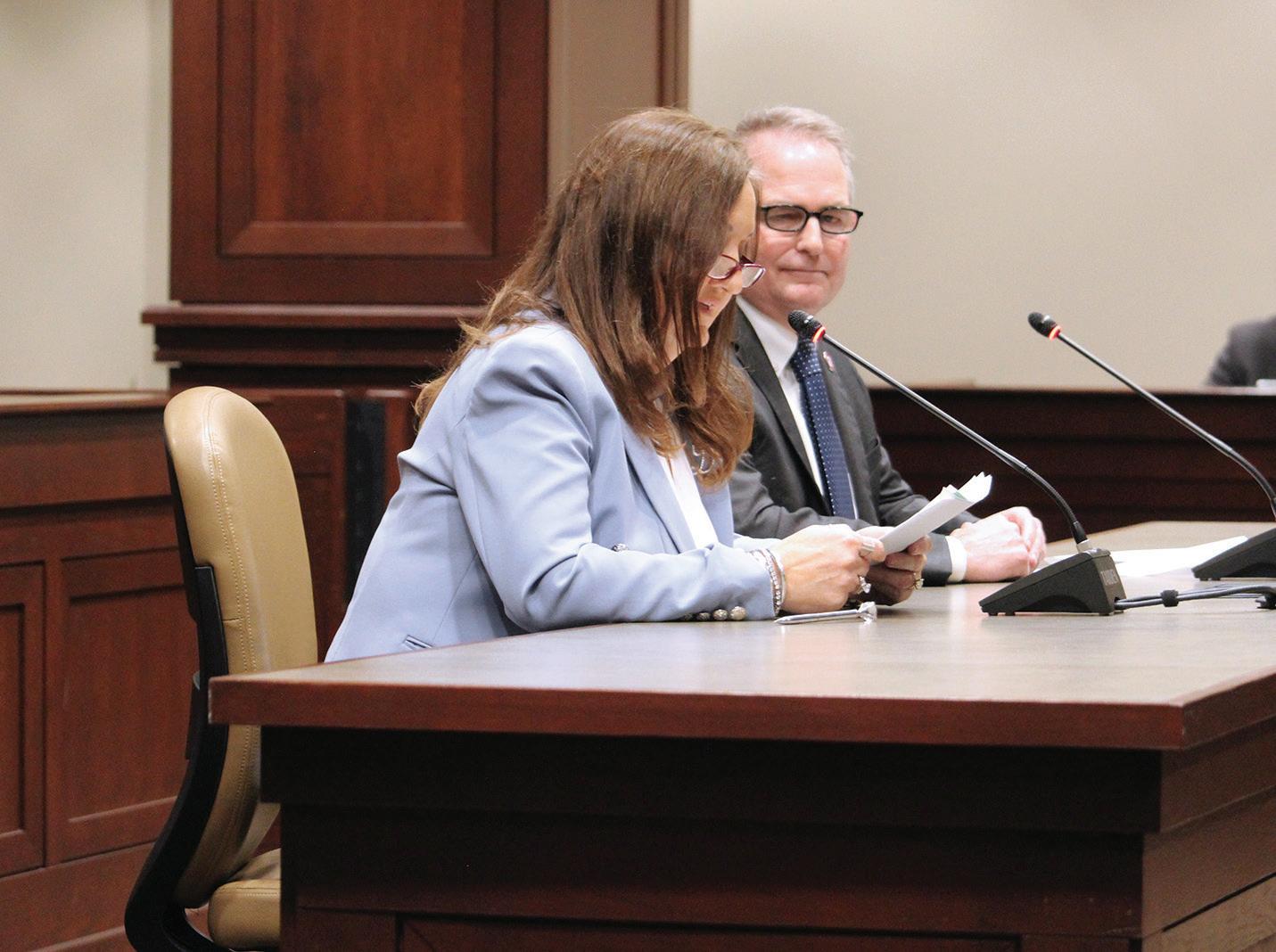
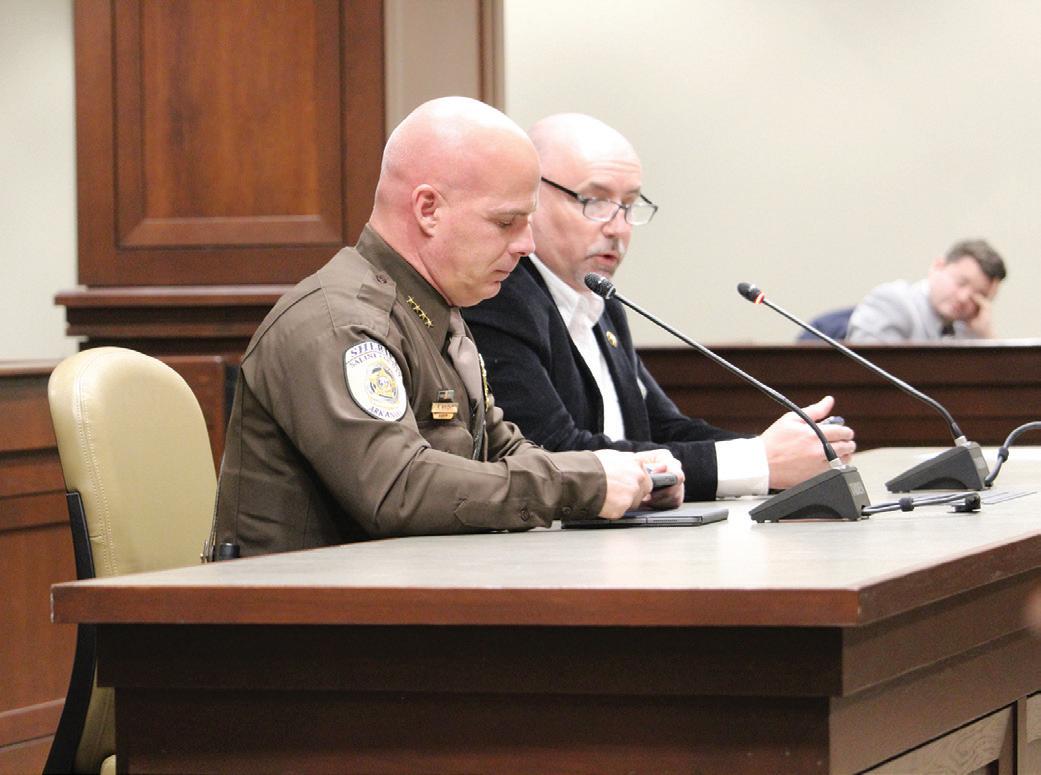
Arkansas State Capitol Snapshots...............................................23 Cybersecurity Efforts.......................................................................29 Stronger Together.............................................................................30 Following in Dad’s Footsteps..........................................................32 AAC Board Profile: Bobby Burns......................................................34 AAC Photo Recap: Legislative Recap...........................................36 AAC Photo Recap: AAC Safety Meeting...................................37 AAC Photo Recap: AAQC.................................................................38 AAC Photo Recap: Collectors..........................................................39 AAC Photo Recap: County Clerks...............................................40
From the Director’s Desk...................................................................7 President’s Perspective.....................................................................9 AG Opinions.......................................................................................12 AAC Research Corner.......................................................................13 Seems to Me.....................................................................................17 Legal Corner......................................................................................20 Governmental Affairs......................................................................22 ARORP Update..................................................................................24 AAC Risk Management Services...................................................28 News from NACo...............................................................................35
In This Issue
Cover Notes: Recapping the legislative session (Photo from iStock)
COUNTY LINES, SPRING 2023 5
— Photos by AAC Communications Staff
June 4-7
Sheriffs
Embassy Suites, Jonesboro
June 21-23
County Clerks
Embassy Suites, Jonesboro
June 21-23
Collectors
Holiday Inn, Texarkana
June 27-30
Circuit Clerks
Fairfield Bay Conference Center, Fairfield Bay
June 27-30
Assessors
Embassy Suites, Hot Springs
Contact AAC
Chris Villines, Executive Director cvillines@arcounties.org
Anne Baker, Executive Assistant abaker@arcounties.org
Loretta Green, Receptionist lgreen@arcounties.org
Eddie A. Jones, Consultant e.jonesconsulting@gmail.com
Mark Whitmore, Chief Legal Counsel mwhitmore@arcounties.org
Colin Jorgensen, AAC Litigation Counsel cjorgensen@arcounties.org
Josh Curtis, Governmental Affairs Director jcurtis@arcounties.org
Lindsey French, Legal Counsel lfrench@arcounties.org
Christy L. Smith, Communications Director csmith@arcounties.org
Sarah Perry, Communications Coordinator sperry@arcounties.org
Michael Roys, ACE Program Coordinator mroys@arcounties.org
June 28-30
Treasurers
Holiday Inn, Texarkana
Aug. 8
24th Annual Randy Kemp Memorial Scholarship Golf Tournament
The Creeks, Rogers
Aug. 9-11
55th Annual AAC Conference
Rogers Convention Center, Rogers
Calendar activities also are posted on our website: www.arcounties.org
AAC Mission Statement
The Association of Arkansas Counties supports and promotes the idea that all elected officials must have the opportunity to act together in order to solve mutual problems as a unified group. To further this goal, the Association of Arkansas Counties is committed to providing a single source of cooperative support and information for all counties and county and district officials.
The overall purpose of the Association of Arkansas Counties is to work for the improvement of county government in the state of Arkansas. The Association accomplishes this purpose by providing legislative representation, on-site assistance, general research, training, various publications and conferences to assist county officials in carrying out the duties and responsibilities of their office.
1415 West Third Street Little Rock, AR 72201 (501) 372-7550 phone / (501) 372-0611 fax www.arcounties.org
Cindy Posey, Accountant cposey@arcounties.org
Jenny Evans, Accounting & Program Assistant jevans@arcounties.org
Mark Harrell, IT Manager mharrell@arcounties.org
Risk Management/ Workers’ Compensation
Debbie Norman, Risk Mgmt. & Insurance Director dnorman@aacrms.com
Misty Petrus, Workers’ Comp Claims Mgr. mpetrus@arcounties.org
Cathy Perry, Program Analyst cperry@aacrms.com
Kim Nash, Workers’ Comp Claims Adjuster knash@aacrms.com
Renee Turner,Workers’ Comp Claims Adjuster rturner@aacrms.com
Jacob Trumble, Claims Analyst jtrumble@arcounties.org
Greg Hunt, Claims Analyst ghunt@aacrms.com
Kim Mitchell, Premium Analyst kmitchell@aacrms.com
Karen Bell, Program Assistant kbell@aacrms.com
Ellen Wood, Admin. Asst./Receptionist ewood@aacrms.com
Brandy McAllister, RMS Counsel bmcallister@arcounties.org
JaNan Thomas, RMS Litigation Counsel jthomas@arcounties.org
Melissa Dugger, RMS Litigation Counsel mdugger@arcounties.org
Aaron Newell, RMS Litigation Counsel anewell@arcounties.org
Mallory Floyd, RMS Employment Counsel mfloyd@arcounties.org
Fonda Fitzgerald, RMS Paralegal ffitzgerald@arcounties.org
Shantina Osborn, RMS Paralegal sosborn@arcounties.org
Samantha Wren, RMS Legal Assistant swren@arcounties.org
Karel Ortega, RMS Legal Assistant kortega@arcounties.org
James Mirus, Member Services Manager jmirus@arcounties.org
2023
6 COUNTY LINES, SPRING 2023
County Lines
County Lines [(ISSN 2576-1137 (print) and ISSN 2576-1145 (online)] is the official publication of the AAC. It is published quarterly. For advertising inquiries, subscriptions or other information, please contact Christy L. Smith at 501.372.7550.
Executive Director/Publisher
Chris Villines
Communications Director/ Managing Editor
Christy L. Smith
Communications Coordinator/ Editor
Sarah Perry
AAC Executive Board:
Debbie Wise – President
Brandon Ellison – Vice President
Jimmy Hart – Secretary-Treasurer
Tommy Young Deanna Sivley
Debra Buckner Dana Baker
Kevin Cleghorn Terry McNatt
Rebecca Talbert Doug Curtis
Gerone Hobbs Marty Boyd
John Montgomery Heather Stevens
Brenda DeShields Selena Blair
Bobby Burns
National Association of Counties (NACo) Board Affiliations
Debbie Wise: NACo board member. She is Randolph County Circuit Clerk and president of the AAC Board of Directors.
Brandon Ellison: NACo board member. He is Polk County Judge and vice-president of the AAC Board of Directors.
Ted Harden: Finance & Intergovernmental Affairs Steering Committee. He is a member of the Jefferson County Quorum Court.

Barry Hyde: Justice and Public Safety Steering Committee. He is the Pulaski County Judge.
Rusty McMillon: Justice and Public Safety Steering Committee. He is Greene County Judge
Kevin Smith: IT Standing Committee. He is the Sebastian County Director of Information Technology Services.
Gerone Hobbs: Membership Committee. He is the Pulaski County Coroner.
Paul Elliott: Vice-Chair of Justice and Public Safety Steering Committee, vice-chair of law enforcement subcommittee. He is a member of the Pulaski County Quorum Court.
Ellen Foote: Community, Economic & Workforce Development Steering Committee. She is the Crittenden County Tax Collector.
Tawanna Brown:Telecommunications & Technology Steering Committee. She is Chief Computer Operator for Crittenden County.
Reflecting on session and things to come
Mark Whitmore told me years ago, as I embarked on my first legislative session in the director’s seat, that a legislative session is not just a race … it is a marathon. Truer words have never been spoken. I used to run 5K races, though my current physique would never impart that thought. But the hardest part of running the race (if you are running it right) is the beginning and the end. In the beginning you must pace yourself to have stamina throughout. Once the proper pace is achieved you must maintain it (the easier part) so that when the crushing pressure of the final half mile hits you, you have the strength to finish strong.
I say this to tell you I am incredibly proud of the legislative team we’ve assembled here at the AAC. They have learned to run the race wisely, to put aside rapid gratification and settle in for the long-haul of our biennial regular sessions, and to have exhausted their strength as the sine die line is crossed. There is a plethora of material in this edition of County Lines that covers specific bills and impacts on our county officials, so I won’t double those efforts in this column. But I do have the personal privilege to brag a bit on our staff here.
Many of you are beginning to hear from our staff liaisons. They are presenting to your respective associations about specific bills (now Acts) that will impact your positions. I want to take a moment to give a well-deserved thank you to them here. To our first bill reader and Treasurer liaison Eddie Jones, our Chief Counsel and Judge/Coroner/Sheriff liaison Mark Whitmore, our County Clerk/Circuit Clerk/JP/Assessor liaison Lindsey French and our Judge/Collector/Circuit Clerk/ JP liaison Josh Curtis ... THANK YOU!
And to you, our honorable county officials… THANK YOU! With approximately 85 percent of our AAC package bills being approved, we had an incredibly successful session. As I’ve mentioned before and will again, our vetting process demands we put quality legislation on the table. This shows when we are successful session after session. And with the great relationships you all have with your legislators, it is an enviable position to be in when we discuss legislation with someone who has already heard from the expert – YOU!
As we close the chapter on a successful 2023 Regular Session, I also cannot thank enough the legislators themselves along with our state constitutional officers including Governor Sanders for the hard work and countless hours put in to making Arkansas’ state and local government second to none. And for the staffs of the respective chambers, the Bureau of Legislative Research, and the constitutional offices, thank you all for your commitment to excellence and hard work during this and every other session.
For me personally, I feel a tinge of melancholy knowing that some of my favorites in the legislature will be going through their last sessions, like retiring Rep. Lanny Fite from Benton. As the former county judge of Saline County, he has been a good friend and a great mentor to me — and a fantastic ambassador for county government. He has led well and always does so with the thought of how
>>>
AAC DIRECTOR’S DESK
Chris Villines AAC Executive Director
COUNTY LINES, SPRING 2023 7
his decisions would affect county government in Arkansas. Well done, my friend!
any questions or recommendations for us moving forward.



Turning an eye to county business, I am excited to help the Association of Arkansas Counties “lean in” to communications as we expand our reach. Communications Director Christy L. Smith and Communications Coordinator Sarah Perry are working on upgrading our capabilities to include better audio and video production. Several times over the last year we’ve had specific issues that would be best addressed through quality video productions. And it is not just us. Most county and municipal associations across the country are embarking on this same step-upward in their communications departments.
Be on the lookout for an increase in these products from us, and as is always the case, shoot us an email if you have

As I close this column, let me do so with a reminder to all of you, make every effort to attend our annual conference this summer in Rogers (Benton County). There are more new county and district officials right now than I believe we have ever had. If I can offer one simple suggestion to you all, it is to attend your association meetings, including the AAC annual conference.
The conference dates this year are August 9-11, and this is our normal Wednesday through Friday schedule. Over the next few weeks, we will begin unveiling the agenda but suffice it to say this looks to be one of the most outstanding conferences we will have had. Already we are on pace to set a record for attendance so register soon.
The theme this year is “Exploring New Frontiers.” Bring your cowboy boots and western gear and get ready to lasso county government with us.
***
***
AAC DIRECTOR’S DESK WE KEEP YOUR COUNTY Springdale Batesville Searcy West Memphis Fort Smith Hot Springs Little Rock Hope Texarkana, TX 9 locations in Arkansas! ROLLING TOLL FREE 877.786.4681 Check out our STM Arkansas stores! 8 COUNTY LINES, SPRING 2023
AAC PRESIDENT’S PERSPECTIVE
Connecting the Fowler legacy to the award

If you haven’t already registered to attend the AAC’s 55th Annual Conference in August, I encourage you to do so. It is a great avenue for getting better acquainted with your fellow county and district officials — and for learning more about issues that affect county government.

Some aspects of conference have become tradition —the Southern Fish Fry, the Dinner and Dance, the closing of conference with “You are My Sunshine” — just to name a few. A more recent tradition is the presentation of the Wes Fowler County Advocacy Award. And in this column, I would like to focus on who Wes was and the legacy he left behind.
I regret that many of you never had a chance to meet and work with Wes. He was a well-respected member of county government. He truly had a heart for service.
Wes was working as a consultant with the AAC when he passed away on Feb.1, 2017. He spent that day at the state Capitol advocating for legislation that would benefit county clerks, as well as funding for new voting equipment. Wes had great expertise in the area, as he had served as Madison County Clerk for 10 years beginning in 1989.
Wes was an active participant in the Arkansas Association of County Clerks. He served as legislative chair and in officer positions. He was set to become president of the association when he was elected Madison County Judge in 1998.
Again, he was active in the judges’ association, serving as legislative chair, second and first vice president, and president. Wes sat on the AAC Board of Directors and was an active Legislative Committee Chairman.
Wes retired as county judge in 2010, but his service to county government did not stop there. He went to work as Governmental Affairs Director at the AAC, a position he held for four years. Wes was a failure at retirement. County
government just coursed through his veins, and in 2014 he became a consultant to the AAC.
Wes did not have a law degree, but he knew state law frontwards and backwards. It was not unlike him to sit in a legislative committee meeting at the Capitol and whisper to the person sitting next to him the answers to questions legislators were asking.
Wes was respected by county and state officials alike. Following his death, then-Gov. Asa Hutchinson wrote to the Fowler family: “Wes’ willingness to serve the people of Arkansas was remarkable, and he did so with honor and integrity.
“He was a leader in developing and improving systems of Arkansas government during his service as county clerk, county judge and through his tenure with the AAC. Wes was an extraordinary man who was above all a beloved husband, father, grandfather, and friend.”
And so, with the Wes Fowler County Advocacy Award, the AAC honors a county or district official who exemplifies Wes’ dedication, honor, and integrity. I hope you will join me at the conference in August to celebrate Wes’ life and the award recipient’s service.
We want your news
Did an aspect of county government “make news” recently in your county? Did any of your county officials or staff get an award, appointment or pat on the back? Please let us know about it for the next edition of County Lines magazine. You can write up a couple of paragraphs about it, or if something ran in your local paper, call and ask them to forward the story to us. We encourage you or your newspaper to attach a good quality photo, too: e-mail csmith@arcounties.org.
Debbie Wise Randolph County Circuit Clerk / AAC Board President
DEBBIE WISE AAC Board President; Randolph County Circuit Clerk
Debbie Wise
COUNTY LINES, SPRING 2023 9










Tax B I L L I N G & C O L L E C T I O N S O L U T I O N S S E R V I C E S O F T W A R E S A T I S F A C T I O N E X P E C T M O R E Browser Based Full Credit Card Integration Fully Documented Multi-payment Processing Unlimited History Public Inquiry Exportable Data Multiple Annual Updates gowithtaxpro.com info@gowithtaxpro.com (501) 246-8060
The Future of
START BUYING Shop Statewide Contracts.
Arkansas’s statewide purchasing cooperative program, ARBUY, makes purchasing through statewide contracts simple. And it’s completely FREE to county governments. Contact us to start shopping today.

SAVE MONEY | SAVE TIME | ENSURE COMPLIANCE | SHOP STATEWIDE CONTRACTS Start shopping contracts Scan the QR code or visit periscopeholdings.com/countyline
From dual offices to constables and APERS
AG OPINION NO. 2023-005
Article 7, §53 of the Arkansas Constitution, as modified by Amendment 95, bars a sitting justice of the peace or an elected county official from holding another civil office during the term the JP or county official has been elected. Amendment 95 of the Arkansas Constitution also amended the terms of office for county elected officials to four-year terms. Ark Code §14-14-115 contains the same proscription and defines “civil office” along with listing numerous offices that constitute civil offices — and even provides a handy list of a litany of offices that do not constitute civil offices. A person holding dual offices is subject to removal from office for violation of this provision. This provision of the Arkansas Constitution is nearly identical to Article 5, §10 of the Arkansas Constitution, which prohibits state legislators from holding dual civil offices. Ark Code §1414-115(a)(1) adds further clarity in providing that a JP or county elected official is prohibited from being elected or appointed to another civil office during the term for which he or she has been elected. Ark Code §14-14-115(c)(2) provides that this section does not generally prevent a person from continuing to hold a civil office the person held before appointment or election to an office under subsection (1), such as JP or county elected official.
AG OPINION NO. 2022-024
If a school district closes, does the property tax levy for that school district transfer to another school district? Yes. The AG explained that if a school district is dissolved, annexed to, or consolidated into another school district, the existing millage taxes of the old district remain in place unless and until changed by the voters of the newly expanded school district.
Mark Whitmore Chief Legal Counsel

AG OPINION NO. 2022-020
The AG determined that a constable is not eligible to participate in the Arkansas Public Employees Retirement System (APERS). The AG concluded that for purposes of APERS, a constable is not a state employee. A constable is a township officer and is not employed by an APERS covered employer. This is regardless of whether the individual is simultaneously employed by the state of Arkansas and an APERS member due to their employment by the state.

AAC AG OPINIONS
Order Your 2022 Arkansas County Compliance Guide Today! COST IS $75 EACH Go to “Directories and Guides” at WWW.ARCOUNTIES.ORG TO PLACE YOUR ORDER.
12 COUNTY LINES, SPRING 2023
Counties, cities, state unite: protect our Arkansas Constitution and public funds
During the 2023 Regular Session, HB1530 was filed seeking to amend Ark. Code Ann. § 2635-902. This section of the code was adopted in 1993. It authorizes the award of attorney’s fees to successful plaintiffs in illegal exaction cases from the refunds to members of a class action. The law is currently limited to cities and counties. The attorney’s fees under the law currently are from the funds declared to be returned or refunded to the member of the class action (the attorney’s fees awarded come out of the tax refunds that are being returned to the taxpayer).
Fortunately, HB1530 was not successful before the General Assembly. Even so, a similar bill is almost certain to resurface in future sessions. It would direct an award of attorney’s fees as costs and apply to instances in which there is no illegal tax but a misdirection of funds. Such an amendment would be in direct conflict with the Arkansas Constitution and would circumvent sovereign immunity and separation of powers. Furthermore, it would mire the cities, counties, and the state in litigation over misallocation cases. Also, the attorney’s fees under HB1530 would not come from escrowed funds or refunds to the taxpayers. They are in addition to the funds recovered.
If HB1530 had passed, it would have added unknown costs to operations of the state, city and counties. Furthermore, it would violate the Arkansas Constitution.
Under current law, most misallocation of funds are detected when audits are performed on county governments by the Arkansas Legislative Audit Department. Corrections are made at the time of the audit exit. In essence, HB1530 would have had the state, city and county be subject to lawsuits and award of attorney’s fees for misallocation of funds. For example, if a sheriff used funds from the communication and equipment fund to purchase a K-9 unit for law enforcement officers (considering a K-9 unit as equipment), and it was later determined the use of those funds for that purpose was improper, under HB1530 the county would be subjected to lawsuits and award of attorney’s fees for this human error.
To best illustrate, during the 2023 Regular Session, Rep. Lanny Fite and Sen. Kim Hammer, sponsored HB1031, now Act 127 of 2023. This Act and Ark Code § 27-70-207 simply direct that cities that misallocate and expend dedicated road funds for an improper use repay those funds to the proper fund. That is a valid solution without the extraordinary expenses to the public of litigation and award of attorney’s fees.
To better understand the extraordinary adverse impact and violations of the Arkansas Constitution set into motion by HB530 one needs to better understand Arkansas law. An illegal exaction is exactly what it sounds like — it’s an exaction unauthorized or contrary to law. The Arkansas Supreme
Court has recognized two types of illegal exaction cases. These cases involve either: (1) a public fund or (2) an illegal tax. A public fund involves the prevention of misapplication of public funds. In these cases, the public funds are being generated from a lawful tax, but then subsequently are misallocated. In cases where the funds have already been spent, the lawsuit seeks to recover the misspent funds back into the coffers of the city, county or state entity. An illegal tax involves a taxpayer who seeks to prevent the government from imposing an illegal tax upon him. Those lawsuits seek a declaration of the tax as illegal and a refund of the tax funds escrowed by the court. Pledger v. Featherlite Precast Corp., 308 Ark. 124, 128, 823 S.W.2d 852, 856 (1992).
Arkansas follows the “American Rule,” which is the default legal rule in the United States. It provides that each party will be responsible for paying its own attorney fees unless they are expressly authorized by statute or rule. This is no less true when the defendant is the sovereign State of Arkansas and its political subdivision — the 75 counties in Arkansas. Under Arkansas law attorneys are not generally awarded attorney’s fees against the city, county or state. The General Assembly’s general silence on the award of attorney’s fees reflects the state’s public policy on the subject. Also, the General Assembly and the Arkansas Supreme Court have traditionally recognized the mandate of sovereign immunity afforded the State of Arkansas and Separation of Powers Doctrine in Article 4 of the Arkansas Constitution.
The Arkansas Supreme Court has determined that there are two narrow exceptions in which attorney fees may be awarded in illegal exaction cases. The first exception is the “common fund” doctrine. The common-fund exception permits the granting of attorney’s fees and other costs of litigation when a plaintiff is successful in creating, increasing, or preserving a public fund that benefits an ascertainable class. The Court reasoned that allowing others to obtain the full benefit from the plaintiff’s efforts without requiring contribution or charging the common fund for attorney fees would be to enrich the others unjustly at the expense of the plaintiff. Walther v. Wilson, 2019 Ark. 105, at 5, 571 S.W.3d 897, 900 (Wilson II).
The second exception is known as the “substantial benefit” rule. Under this exception, the court is permitted to award attorney’s fees from a defendant if the plaintiff’s action results in a substantial benefit to the class or a business corporation.

AAC RESEARCH CORNER See “FUNDS” on Page 14 >>>
Madison Folsom Law Clerk
COUNTY LINES, SPRING 2023 13
AAC RESEARCH CORNER
However, it does not create a monetary fund from which fees might be awarded. In Millsap, the Court affirmed awarding attorney fees when the plaintiffs derivative action preserved a large sum of corporate assets, which benefited the corporation. Millsap v. Lane, 288 Ark. 439, 442, 706 S.W.2d 378, 379-80. In Lake View, the Court determined that a substantial benefit had been conferred because it involved statewide public interest because it concerned millions of dollars in taxpayer money and eliminated disparities in funding and opportunities for students, benefiting not only the poorer school districts but the state as a whole. Lake View School District. No. 25 of Phillips County v. Huckabee, 340 Ark. 481, 495 10 S.W.3d 892, 900-01 (2000). The Court emphasized, “this is a unique case with a unique set of circumstances” and that we did not sanction attorneys’ fees “in all public-interest litigation or endorse a new exception to the American Rule.” Id. at 497, 10 S.W.3d at 902. The Arkansas Supreme Court was deliberate and expressly allowed only attorney fees because it found it to be a very special and particularized set of circumstances.
HB1530, if passed, would have created an entirely different level of interplay and inconsistency between two provisions of the Arkansas Constitution. First, the Constitution expressly grants the state sovereign immunity. Ark. Const. Art. 5, § 20. Sovereign immunity is a broad, jurisdictional immunity from suit, meaning the State cannot be made a defendant in court. In essence, a case will be barred if a judgment in favor of the plaintiff would control state action or coerce the state. Bd. of Trs. of Univ. of Ark. v. Andrews, 2018 Ark. 12, 10 535 S.W.3d 616, 622. Second, the Arkansas Constitution provides that “any citizen of any county, city, or town may institute suit, on behalf of himself and all others interest, to protect the inhabitants thereof against the enforcement of any illegal exactions whatsoever.” Ark. Const. Art. 16, § 13.
To be clear, the Arkansas Constitution provides state taxpayers the right to file illegal exaction lawsuits against the county, city, or town. Traditionally, however, at their core these suits have been to adjudicate whether an alleged activity is legal and if proper to enjoin the alleged activity. In actuality, the doctrine of sovereign immunity is in direct conflict with expanding to Arkansas Code § 25-35-902 as sought under HB1530 to allow for an attorney’s fees against the “state, county, city, or other governmental entity” where there is no escrow of funds from which to pay a taxpayer refund. The amendment as well poses a separation of powers issue. Neither the General Assembly nor the courts have the power to coerce the state or override a constitutional provision. As a result, the General Assembly and Arkansas Supreme Court would be barred from passing such legislation because it is inconsistent with the framers’ intentions. This is due to the
long-standing precedent established in Fairbanks v. Sheffield, 226 Ark. 703, 292 S.W.2d 82 (1956).
In Fairbanks, the Court held that a statute allowing suit against the state park system was “an unconstitutional attempt on the part of the legislature to consent to a suit against the state.” Id. at 84. Further, article 5, section 20 is “mandatory and cannot be waived by the General Assembly.” This is not to say that taxpayers would simply be without remedy in these types of cases. Suits that subject the State of Arkansas to monetary liability have a proper jurisdiction redress against the state: file a claim with the Arkansas Claims Commission.
In 2022, the Arkansas Supreme Court decided the case of Gibson v. Buonauito, 2022 Ark. 206. 655 S.W.3d 59. In a previous appeal, the Court held that tax funds levied from Amendment 91 of the Arkansas Constitution could only be used for constructing or improving four-lane highways. The use of Amendment 91 funds for two projects involving six-lane interstate highways constituted an illegal exaction. Buonauito v. Gibson, 2020 Ark. 352, 609 S.W.3d at 386.
The case was remanded to the circuit court, and it entered an amended order declaring an illegal exaction and enjoined the use of Amendment 91 funds on the projects. The court determined that $121 million of the fund was misspent. Later, the circuit court entered an order awarding $18,160,000 in attorneys’ fees to the taxpayers’ attorneys. Additionally, the attorneys were awarded $6,896.70 in costs.
On appeal, the state argued that the circuit court erred in awarding attorneys’ fees. Specifically, that (1) sovereign immunity bars the award of attorneys’ fees; (2) no statutory authority exists for awarding the fees; and (3) appellees are not entitled to attorneys’ fees because the American Rule exceptions do not apply. The plurality held that this case was distinguishable from Lake View because there was no substantial benefit in this case because no state funds were recouped. It reasoned that Ark. Code Ann. § 26-35-902 was inapplicable because the present action was brought against the state and the statute does not permit attorneys’ fees. The statute provides:
(a) It is the public policy of this state that circuit courts may, in meritorious litigation brought under Arkansas Constitution, Article 16, § 13, in which the circuit court orders any county, city, or town to refund or return to taxpayers moneys illegally exacted by the county, city, or town, apportion a reasonable part of the recovery of the class members to attorneys of record and order the return or refund of the balance to the members of the class represented.
In his concurrence, Arkansas Supreme Court Associate Justice Shawn Womack stated, “[n]othing in our state law currently authorizes attorney fees to be paid in an action such as the one before us. Therefore, I call upon the members of
From Page 13 <<< 14 COUNTY LINES, SPRING 2023
FUNDS Continued
the General Assembly to visit this situation to determine their policy-making role. I believe attorneys in future actions of this nature should be authorized to receive compensation. It is the legislature that possesses the power to do so, not the courts.”
He called upon the General Assembly to “consider whether a law to allow recovery of these fees against the State, as exists for claims against counties, cities and towns is appropriate.”
However, this call to action would violate sovereign immunity. Justice Womack stated, “… this court has recognized that the legislature does not have the authority to waive sovereign immunity and authorize suits against the state generally…” He further noted that the legislature could have included orders against the state or any of its agencies in Ark Code § 26-35-902. In interpreting the statute, he said:
“…while the language of the statute tracks with the constitution’s reference to “county, city, or town,” the phrase in article 16, section 13 modifies “[a]ny citizen.” Thus, it qualifies who may file suit and does not limit which public entities can be sued. Ark. Const. art. 16, § 13. Thus, it qualifies who may file suit; it does not limit which public entities can be sued.”
HB1530 sought to allow attorney fees in misallocation of funds cases. This would be in direct conflict with Ark. Const. Art. 5, § 20. HB1530 would have a circuit court in Arkansas rendering a monetary judgment against the State of Arkansas,
it’s coffers and the State Treasurer to disgorge funds not held in escrow by the Court. Most judges, legal scholars, legislators and citizens should see HB1530 as a direct violation of mandate of Article 5, Section 20: “The State of Arkansas shall never be made a defendant in any of her courts.” Additionally, HB1530 seeks to have the attorney’s fees awarded as cost on top of the sums refunded to taxpayers or recovered. The General Assembly simply does not have the power to waive sovereign immunity because it is a Constitutional protection.
Finally, AAC Consultant Eddie A. Jones has over 42 years of experience in county government. He was treasurer for Randolph County for 26 years, and he was executive director of AAC. He adds that most misallocation of funds are detected when audits are performed on county governments by the Arkansas Legislative Audit Department. Corrections are made at the time of the audit exit. Moreover, he says, “County government is a required public entity providing mandated and crucial services such as public safety, the incarceration of prisoners, and many other services that cannot be compromised by possible financial ruin because of the opening of the floodgates to lawsuits and awards of attorney’s fees. The purpose of governmental immunity is clear. It is safety with solvency. I think counties are entitled to both.”
AAC RESEARCH CORNER YeeHaw! YeeHaw! EXPLORING NEW FRONTIERS ASSOCIATION OF ARKANSAS COUNTIES 55TH ANNUAL CONFERENCE AUGUST 9-11, 2023 BENTON COUNTY, ARKANSAS EMBASSY SUITES AND ROGERS CONVENTION CENTER COUNTY LINES, SPRING 2023 15


www. nancial-intel.com www.facebook.com/FISoftwareSolutions © 20 Financial Intelligence. All rights reserved.
Smooth running counties
We have just finished a few intense months in county government. Not only did we start the year of 2023 with scores of new county officials, but we also just travailed a regular session of the Arkansas General Assembly with many new legislators. Of course, there is no such thing as a “regular” session of the Arkansas Legislature anymore, except in its defining of the odd-year session.
Legislation is what I want to talk about. Legislation is the precursor to law. Law is what you held your hand up and swore to uphold as an elected official or a deputy to an elected official.
Some of you have been wondering recently why the Association of Arkansas Counties (AAC) and the other affiliate associations place so much emphasis on new legislation. I refer you to the previous paragraph. It’s because you swore to uphold the laws affecting your office operations — all of them. You can’t uphold them if you don’t know what they are.
The doctor said, “Your x-ray showed a broken bone, but we fixed it in Photoshop.” That doesn’t really work. Neither does glibly going along operating one of the elective offices or departments of county government without knowing the laws that govern the operation.
Keeping up with legislation is one of our jobs at the AAC. Reading and analyzing all the bills that are filed is our responsibility. I’m not telling you that reading legislation is fun and exciting; it’s not. Believe me. I review and read all the bills that are filed and write a report of those that affect county government.
No, it doesn’t excite me, and it’s not easy; but as they say “somebody’s gotta do it.” I’m just the starting point — the first reader of legislation. However, it is not me or other staff members at the AAC that must abide by and put those new laws into operation. That would be you — the elected officials and your staffs.
It’s not necessary for you to have an in-depth understanding of every bill that impacts county government. But it
is important to at least have a simple grasp of new legislation that could impact your county. It is imperative for you to have a complete detailed understanding of the new laws that affect the operation of your office or department. Remember that oath you took? You simply cannot keep that oath without knowing the law.
Eddie A. Jones County Consultant

The Arkansas General Assembly passes hundreds of laws every regular session held in the odd-numbered years. This year alone, the House of Representatives filed 849 bills and the Senate filed 590 bills. Of the total 1,439 bills filed, 890 became law.
During the legislative session, the AAC was tracking at least 453 bills affecting county government in some fashion. That number represents 31.5 percent of the total bills filed. Many of those that were good for county government were enacted, while many of the bad bills were defeated.
But there were some good bills that did not make it — and a few bad ones that slipped through. For a little baseball analogy, I think we batted an unbelievably strong .800. Hey, that’s considered unachievable in modern day baseball. The last time a pro baseball player had a batting average over .400 was the .406 that Ted Williams hit for the Boston Red Sox back in 1941. I think the main reason we couldn’t have a near perfect season, I mean session, is that good and bad ideas both come from the same fountain — if you know what I mean.
Other AAC staff members are providing articles with more detail about specific bills. My whole purpose in this article is to point to the importance of knowing county government law and the changes that are made in those laws every legislative session.
Here are a couple of examples. In the 2021 legislative
AAC SEEMS TO ME...
See “SMOOTH” on Page 18 >>>
They keep up with new legislation and know the law
COUNTY LINES, SPRING 2023 17
It’s not necessary for you to have an in-depth understanding of every bill that impacts county government. But it is important to at least have a simple grasp of new legislation that could impact your county.
session, Act 954 added a section of law [§ 14-14-116] that mandates a required publication made by a county include the statement, “This publication was paid for by,” and then has to identify the county entity responsible for payment; identify the office responsible for payment; and disclose the amount paid for the publication.
Whether that is good law or bad is beside the point — it is the law. Guess how many times I saw required newspaper publications without this disclaimer? Suffice it to say, several times. Take the time to keep up with changes in law.
Act 752 of 2021 authorized the quorum courts to appropriate up to 100 percent of the anticipated revenues for federal financial assistance from a federal agency, circumventing the 90 percent Rule for counties in accordance with § 14-20-103. Yet, I received many calls from counties wondering if they had to abide by the 90 percent Rule concerning the American Rescue Plan Act funds, which were characterized when distributed to counties as additional “federal financial assistance.”
Those are just two examples from one legislative session out of hundreds of changes in county law. I know I sound like I’m scolding you, but that’s not what I’m doing. That’s not my intent. I’m saying it is important to track and keep up with changes in law that affect your office. It is part of your job, part of your responsibility as an elected official and part of your duty as a public servant.
I get it. There is not a one of us that can know it all — even if there are a few who think they do. I have done my best over the years to try to keep up with county law and still learn things almost daily in my work. I’m always willing to help when I can. My cell phone number is (870) 810-0115 . If you want to contact me by email my address is e.jonesconsulting@gmail.com . Feel free to contact me. But don’t let my offer lessen your responsibility to read, learn and study.
The 94th General Assembly session just ended recently. As I mentioned, AAC tracked 453 bills that would affect county government. Not all of them were enacted, but many were. And some of them were comprehensive.
Just to mention two or three changes; Act 472 requires the county annual financial report publication be paid for totally by the county treasurer, which saves general fund money. Act 315 increases the homestead property tax credit from $375
to $425. That change affects the operations of at least three county offices — the assessor, collector and treasurer. And what about all those election bills that were filed? There were literally dozens of them … about six dozen. Not all of them were enacted but many were. All I can say is, “I’m sorry,” to the county clerks, election coordinators and county election commissions. AAC Legal Counsel Lindsey French and many of Arkansas’ county clerks worked tirelessly on these bills trying to lessen the hurtful impact in conducting elections.
I encourage you to attend every seminar or association meeting possible to learn about the many changes in county law resulting from the recent legislative session. Some are already in effect because they had an emergency clause. Others will be effective soon.
Don’t be like the woman in court. The judge asked her if she was married and she said, “No, I’m divorced.”
“And what did your husband do before you divorced him?” the judge asked.
Her reply was, “A lot of things I didn’t know about.”
Please don’t let there be a lot of things you don’t know about. Take every opportunity possible to learn the law concerning the operation of your office. Yes, it takes time and effort, but it is your responsibility. And what you learn today may change tomorrow — or at least when the Legislature meets. The job requires constant learning and relearning.
It is a fundamental legal principle in the United States that ignorance of the law is no defense. If ignorance were accepted as an excuse, any person charged with a criminal offense could claim ignorance to avoid the consequences. Laws apply to every person within the jurisdiction, whether they are known and understood.
I’m sure you will recall Arkansas Constitution, Article 19, § 20: “I, ________, do solemnly swear that I will support the Constitution of the United States and the Constitution of the State of Arkansas, and that I will faithfully discharge the duties of the office of ________, upon which I am now about to enter. So help me God.”
You must know the law to faithfully discharge the duties of your office. Don’t raise your hand and swear to it if you’re not going to do it. You are in the wrong business if you’re just wanting to slip-slide through. County government is hard work. Remember this: “Hard work beats talent when talent doesn’t work hard.”
Hard work makes for a smooth running county.
AAC SEEMS TO ME... SMOOTH Continued From Page 17 <<<
www.arcounties.org 18 COUNTY LINES, SPRING 2023


" Spread
And Evenly While
"
Gravel Quickly
Dumping
F or Cross Gate Trailer Information, C ontact:
The state of ‘open public meetings’ law after 94th General Session
The General Session of the 94th General Assembly was full of hot-button issues, but maybe none so polarizing as the bills filed to amend the Freedom of Information Act (FOIA). The Arkansas FOIA, initially passed in February 1967, ensures that Arkansas citizens have access to public records and that “public meetings” are held in a way that they are transparent and open to the public. While there was a wide range of different views among legislators and citizens regarding if and how Arkansas FOIA should be amended, there was one statement nearly everyone on both sides could agree on — Arkansas’s public meeting laws are confusing — and confused citizens become angry citizens. An ambiguous statutory scheme combined with decades of Arkansas Supreme Court case law attempting to interpret the statutes leaves even the “experts” disagreeing on what does or does not constitute a “public meeting” in Arkansas.
Arkansas Code § 25-19-103(6) defines “public meeting” as “the meetings of any bureau, commission, or agency of the state or any political subdivision of the state, including municipalities and counties, boards of education, and other boards, bureaus, commissions, or organizations in the State of Arkansas, except grand juries, supported wholly or in part by public funds or expending public funds.” As an attorney, nothing frustrates me more than a definition that defines a word using the word itself. The definitions section of FOIA is silent on what a “meeting” is.
The next step is to look to Arkansas Code § 25-19-106, entitled “Open public meetings — Exceptions:”
(a) Except as otherwise specifically provided by law, all meetings, formal or informal, special or regular, of the governing bodies of all municipalities, counties, townships, and school districts and all boards, bureaus, commissions, or organizations of the State of Arkansas, except grand juries, supported wholly or in part by public funds or expending public funds, shall be public meetings.
Once again, the code fails to define what a “meeting” is. This section refers to “all meetings … of the governing bodies” of all qualifying entities. Is a meeting of a governing body a quorum of the body that can conduct business? Two members, three members? For 56 years, this question has remained unanswered by Arkansas law. However, the Arkansas Supreme Court has provided tidbits of clarity over the years that are worth noting.
The first open meetings case to reach the Arkansas Supreme
Court after the passage of FOIA was a mere year after its passage. In 1968, the Court ruled in Laman v. McCord that the North Little Rock city council violated the open public meetings portion of the Act when the full council met with its attorney behind closed doors to discuss a Public Service Commission proceeding to which the city was a party. A few years later, the Court ruled that committee meetings were meetings subject to FOIA “[w]hen a committee of a board meets for the transaction of business.” Arkansas Gazette Co. v. Pickens (1975).
LINDSEY FRENCH General Counsel

One year after Pickens, the Court ruled in Mayor and City Council of El Dorado v. El Dorado Broadcasting Company. The Court distinguished between “unofficial group meetings for the discussion of governmental business,” which it said were subject to FOIA, as opposed to “those contacts by the individual members that occur in the daily lives of every public official,” which are not subject to FOIA. The Court went on to state: “we do not interpret the trial court’s judgment as applying the Freedom of Information Act to a chance meeting or even a planned meeting of any two members of the city council. By its very terms the trial court’s order applies only to those group meetings such as the facts here showed — i.e. any group meeting called by the mayor or any member of the city council at which members in the city council, less in number than a quorum, meet for the purpose of discussion or taking any action on any matter on which foreseeable action will be taken by the city council.” Two justices authored dissents, pointing out that the ruling seemed to contradict itself — opining that the ruling applied only to the facts at hand (a group meeting called by a mayor or member of the council to discuss city business), but also that FOIA “was intended to cover informal but unofficial group meetings for the discussion of county business.” The Court’s ambiguous opinion left not only the justices confused, but Arkansas citizens as well.
For the sake of brevity, I’ll skip forward to 2004, when the Arkansas Supreme Court ruled in Harris v. City of Fort Smith. In this important case, the Court ruled that one-on-one meetings between the city administrator and members of the city board of directors, “by which the board approved bidding on the property, as well as bid amounts, constituted a Board meeting subject to the FOIA” (emphasis added). In its opinion, the Court specifically ruled that one-on-one meetings for the purpose of obtaining a decision of the board was in violation
AAC LEGAL CORNER
20 COUNTY LINES, SPRING 2023
of FOIA and was distinguishable from “a meeting of two” as discussed in El Dorado. This case made clear that one-on-one meetings polling members of a governing body could not be used in place of a formal meeting in order to usurp the public meeting requirements of FOIA.
Several years later in 2012, the Court heard McCutchen v. City of Fort Smith, after the city administrator presented a memorandum expressing his opinion on a proposed ordinance to individual members of the city’s board of directors in advance of a public study session. In the memo, the city administrator recommended that board members pass the proposed ordinance, and subsequently, some members voluntarily stated their positions to the city administrator. However, responses were not solicited, and there was no evidence that discussion over the matter took place before the public meeting. Therefore, the Court ruled that no violation of the openmeetings provision of FOIA occurred.
Finally, in 2019 the Court took up the matter of City of Fort Smith v. Wade. Fort Smith citizen Bruce Wade filed suit against the city board of directors alleging that they and the city administrator exchanged emails related to city business. However, the Court was not persuaded by Wade’s arguments. A brief factual background regarding the subject emails is helpful to understand the Court’s ruling: There was an email group consisting of the city directors and administrator. One director sent an email to the group regarding upcoming issues focused on the performance of a newly appointed police chief. The city administrator sent a subsequent email to the group regarding the police department’s hiring policy along with his opinion on the matter. Two directors responded that they agreed with the administrator. The group sent more emails in the following days, including one by the city administrator giving the board “four possible options” of action, to which two directors responded. The proposed changes were discussed at length at an open public board meeting where a non-binding action was taken in favor of the police chief’s proposal.
The Court held that while email communications could constitute a meeting subject to FOIA, like telephone polling
or serial third-party contact used to obtain approval of an action, the emails in this case did not constitute a meeting. The Court ruled that the emails provided background information and shared “non-decisional” information. As in McCutchen, the Court stated that no responses were solicited, no decision was made, and the proposal was properly discussed at the board’s subsequent public meeting. Although the administrator sent his recommendations on the proposal and received three unsolicited responses, the Court found that the communications in this case did not violate the open-meeting provisions of FOIA.
So, what is the status of open public meetings law in Arkansas? Frustrated by the lack of absolute clarity of what constitutes a meeting, Arkansas lawmakers attempted to define a “public meeting” in the recent legislative session. Sen. Alan Clark filed SB382, which would have made virtually any interaction between two members of a governing body other than “a chance interaction” a public meeting, regardless of the topic of discussion, and not exempting social gatherings, athletic events, church gatherings, etc. On the other end of the spectrum, Rep. Mary Bentley filed HB1610, which would have defined a public meeting as “a quorum of” a governing body, later being amended to “no more than one-third” of a governing body. Both bills failed to pass out of the Senate.
As a result, Arkansans are left with a vague statutory definition and a body of case law that has set some shifting parameters. Telephone polling and serial one-on-one meetings soliciting responses for the purposes of subverting a public meeting are clearly a violation of FOIA open public meetings law. However, emails (and it would reason to infer other types of communications) between members of a governing body that are informational only and do not solicit responses about how to vote on a topic are not a violation of FOIA, according to the Arkansas Supreme Court in 2019. Until the General Assembly sees fit to amend the definition of “public meeting,” members of a governing body should rely on the law set by the Arkansas Supreme Court and stay within the parameters of the few circumstances that have been adjudicated.

We want your news
Did an aspect of county government “make news” recently in your county? Did any of your county officials or staff get an award, appointment or pat on the back?
Please let us know about it for the next edition of County Lines magazine. You can write up a couple of paragraphs about it, or if something ran in your local paper, call and ask them to forward the story to us. We encourage you or your newspaper to attach a good quality photo, too: e-mail csmith@arcounties.org.
COUNTY LINES, SPRING 2023 21
AAC GOVERNMENTAL AFFAIRS
Wrapping up the legislative session
The 94th General Assembly was a success for Arkansas and her counties. The House of Representatives filed 849 bills, while the Senate filed 590 bills, for a total of 1,439. This number is down from 2021, when both chambers filed a total of 1,727 bills. Ultimately the 94th General Assembly passed 890 bills, which is significantly lower than the 1,116 passed by the 93rd General Assembly. The AAC tracked 448 bills this session. That’s over 30 percent of the bills filed. Two hundred forty-three of these bills became law. The AAC legislative package included 33 bills. Of those, the AAC legislative team secured the passage of 28. Of course, we would like to have pitched a perfect game, but a complete game 3-hit shutout is pretty darn good.
Gov. Sarah Sanders’ first session could not have gone any better for her agenda for Arkansas. Normally the session gets off to a slow start, and I think the start of this session was even slower than most. Everyone was waiting on the “education bill” to be filed. If I heard it once, I heard it 100 times: “When is the Governor’s education bill going to drop?” Sanders campaigned for two years on improving education, so it wasn’t a surprise when she made that her top priority. The education bill, now called the Arkansas Learns Act, garnered plenty of attention and debate. There was probably more debate on this bill than any other bill in the past. It set the record for the longest committee meeting, going well into the night on multiple occasions. However, at the end of the day, the legislature passed the Arkansas Learns Act by a wide majority. This bill did consume the Bureau of Legislative Research (BLR) bill drafters. BLR is basically the staff for the legislators. They provide research, draft and prepare bills for filing. Some of our bills took a little longer than normal to be prepared because of all the work BLR put into the education bill.
Another top priority for the Governor was public safety. The Governor and Attorney General Tim Griffin went after violent career criminals that make our communities unsafe. Judges and sheriffs alike have been pushing for stronger laws and more prison space for years. Under the former administration, when state prisons reached capacity, the Governor would invoke the Emergency Powers Act (EPA), which allows the Department of Corrections (DOC) to release criminals before they have served their full sentence. We joke around here and say it’s hard to get into prison through the front door, but it is easy to get out because the back door is wide open. Sen. Ben Gilmore and Rep. Jimmy Gazaway sponsored SB495, now Act 659 — The Protect Arkansas Act. This bill put truth in sentencing for violent hardened criminals and repeat offenders. Under this new law those who commit the most heinous crimes — such as murder, rape, sex trafficking and internet stalking of a child — will serve 100 percent of their sentences.
Those who commit other highly serious crimes — such as battery in the first and sexual indecency with a child — will serve a minimum of 85 percent of their sentences. The Protect Arkansas Act prohibits the EPA eligibility of the 100 percent and the 85 percent classes.
Josh Curtis Governmental Affairs Director

State prisons are at max capacity, and county jails are holding over 2,000 state inmates waiting to be transferred to DOC. This backup puts a strain on misdemeanor justice; most if not all county jails haven’t held a misdemeanor in a decade. The county jail is supposed to be a holding facility for preadjudicated and misdemeanor crimes. Their inability to hold individuals for lesser crimes reduces our quality of life. Think about it: if someone knows he or she will not go to jail for breaking into a car or shoplifting, why not try to get away with it? They steal your kids’ bicycle or the packages off your front porch. Our justice system should alter this behavior early before it becomes increasingly more violent. The Governor, Attorney General and the General Assembly understand this and for that reason they dedicated over $300 million to build a 3,000-bed prison. A new prison has not been built since the early 2000s. This new prison will help keep our communities safer. This was the top priority for the judges and sheriffs this session, and they were key players in the passage of this bill and The Protect Arkansas Act.
Sanders campaigned on reducing the state income tax rate, so it was no surprise that she pushed for a $150 million tax cut. Her tax cut bill flew under the radar relatively speaking. Sen. Jonathan Dismang and Rep. Les Eaves sponsored SB549, which is now Act 532. This law reduces individual income rates from 4.9 percent to 4.7 percent, and it reduces the state’s top corporate tax rate from 5.3 percent to 5.1 percent, retroactive to Jan. 1, 2023. With the focus on education and public safety, the Governor implemented wise tax cut measures.
Other bills that were good for the counties were SB72 and HB1354. SB72, now Act 133, was sponsored by Sen. Jimmy Hickey. This new law deals with county jail reimbursement. It does not raise or lower the amount — the amount is $40 per day per state inmate. However, this bill allows the $40 per day to begin accruing as soon as the inmate is sentenced. Historically the DOC did not start paying the per day rate until the court and the counties sent in the right paperwork (the paperwork still must be submitted). The financial impact study estimates that counties will receive over $5 million more
22 COUNTY LINES, SPRING 2023
a year in county jail reimbursement because of this new law. Another bill that doesn’t get as much attention but may be a good revenue stream in the future is HB1354. Rep. Mike Holcomb and Sen. Ron Caldwell sponsored this bill that is now Act 211. It amends the definition of highway revenues for electric and hybrid vehicles. When the legislature passed the original fee for these vehicles, they did not split the revenue 70/15/15 among the state, cities and counties. All the money was going to ARDOT. This law changes that; counties will now get their 15 percent share. It isn’t a lot of money right now, but it could be in the future as more consumers purchase electric and hybrid vehicles.
AAC Legal Counsel Lindsey French, who represents the county clerks, had a busy session working on election-related legislation. There were almost as many election bills filed as appropriation bills. A total of 78 bills affecting elections in Arkansas were filed. The Heritage Foundation (a conservative think tank) publishes an election integrity scorecard for every state in the union, and Arkansas ranks 6th in the nation. There has been a push over the last couple of sessions to move Arkansas to the top of that list. Out of 78 bills files, 48 were signed into law. Some legislators say Arkansas will be No. 1 in
the nation for election integrity after this session.
Interestingly, the legislature approved only one proposed constitutional amendment. Normally they send at least two, if not three, proposed amendments to the voters. The last time they passed out only one was in 1985. In 1994, voters had only one proposed amendment to decide because the Arkansas Supreme Court struck down the others before Election Day. HJR1006, if approved by the voters, would allow Arkansas lottery scholarships to be used at vocational or technical schools. Right now, those scholarships can be used only for two-year and four-year colleges and universities.
One last bill I will leave you with is the increase in the homestead tax credit. HB1032 by Rep. Lanny Fite and Sen. Hickey, now Act 127, increases the homestead tax credit from $375 to $425. Every Arkansan who pays property tax on their homestead will get an additional $50 credit.
County government had a good session, and every county and district official should be proud of the work that all the associations put into this session. A large number of elected officials came to the Capitol or reached out to their legislators. Without the participation by our members, we could not do our job. Thank you for a job well done.
ArkAnsAs stAte CApitol snApsHots
The 42nd Annual State Peace Officers’ Memorial Day Service was held on the state Capitol grounds on Monday, May 8, 2023. The Arkansas Sheriff’s Association Honor Guard advanced the colors. Several law enforcement officers and Gov. Sarah Sanders participated in the ceremony during which seven fallen Arkansas law enforcement officers were honored. They are Sgt. Joshua Daniel Caudell with the Arkansas Department of Corrections, Sr. Cpt. Michael Ray Springer with the Arkansas State Police, Cpl. Jeffery Wayne Neel of the Arkansas Game and Fish, Benton County Detective Paul Dean Newell, Perry County Detention Officer Jeremiah James Story, Sebastian County Sgt. William Joseph Shibley, and Sgt. Donald Mark Scoby of the Stuttgart Police Department. At right, Drew County Lt. Rick Harvey salutes the wreath on which he and fellow officers pinned seven carnations, one for each fallen officer.

GOVERNMENTAL AFFAIRS
AAC
— Photo by Sarah Perry
COUNTY LINES, SPRING 2023 23
Updates on Opioid Settlement funding disbursement
Story by Kirk Lane, Tenesha Barnes & Colin Jorgensen Arkansas Opioid Recovery Partnership, AAC Litigation Counsel
As you may know, Arkansas counties and cities, represented by the Arkansas Municipal League (AML) and the Association of Arkansas Counties (AAC), will receive over $200 million dollars in opioid settlement funding to abate and alleviate the impact of Arkansas’s opioid epidemic, across the next 10 to 15 years.
The AML and the AAC formed the Arkansas Opioid Recovery Partnership, which ensures settlement dollars are dispersed to vetted organizations that are using evidence-based programs and strategies to abate the opioid epidemic in Arkansas’ cities and counties. This update will provide a look into recently funded ARORP projects. If you do not see a project in your county, please encourage organizations in your area to apply for funding.
Here are some quick updates as of April 14, 2023. If you have questions about submitted applications in your area, please reach out to ARORP Deputy Director Tenesha Barnes at tbarnes@arorp.org.
Snapshot of applications received
• ARORP has received 84 applications for funding totaling $50,422,781.19.
• ARORP has approved 51 applications for funding totaling $7,652,398.
• ARORP has four projects totaling $211,607 that are in line for ARORP Advisory Board review.
• ARORP has 11 projects totaling $8,715,568 that require additional information from the applicant.
• ARORP has denied 15 applications totaling $31,159,977.20.
• Three applicants have withdrawn their applications totaling $1,429,181.45.
Funded projects in your county
Each time ARORP disburses settlement dollars to a project in opioid prevention, treatment, or recovery, we turn the county where the project originated purple on the map on

AAC ARORP UPDATE
Arkansas Opioid Recovery Partnership (AORP) awarded a grant of more than $25,000 to River Valley Medical Wellness in Pope County. The funding will be used to provide training to the community on the use of naloxone.
24 COUNTY LINES, SPRING 2023
our website. Our initial goal is to turn the entire state of Arkansas purple, meaning that every county has received opioid settlement funding.
ARORP announced readiness to receive applications and the first meeting of the ARORP Advisory Board was held on Nov. 4, 2022. In less than six months, ARORP has put $7,652,398 opioid settlement dollars back into Arkansas cities and counties. Funding has supported:
• New recovery housing providing 30 new beds for men in Johnson County
• A recovery community organization in Craighead County providing services like housing referrals, transitional living placement, support groups, financial literacy courses, Narcan trainings and community support to more than 400 peers
• Two overdose response teams in Garland County (Hot Springs Police Department) and Craighead County (Craighead County Sheriff’s Office).
• A statewide effort to support families who have experienced overdose — Hope Movement Coalition

• Support for Arkansas Drug Takeback, including new Take Back boxes
• A treatment/recovery center in Pulaski County
• A treatment/recovery center in Logan County
• Support for the Sevier County Detention Center drug treatment program, including funding for peer support specialists within the jail
• Funding for peer support specialist positions at Crisis Stabilization Units
• Funding for training for Coalition Partnership Empowerment (COPE) community coalitions. At the end of their training and ARORP funding, these community coalitions will be able to apply to be a Drug Free Community (DFC), with federal funding to become

sustainable, transformative forces in their communities
• A training program for Arkansas’ county judges and county and city officials to protect their communities by utilizing COPE community coalitions to abate the opioid epidemic
• 12,228 naloxone kits dispersed and naloxone community trainings provided across 20 counties by Naloxone Community Heroes, including:
1. Hot Springs Police Department — Garland County
2. University of Central Arkansas Addiction Studies Program — Faulkner County
3. River Valley Medical Wellness — Pope County
4. Saline Health Foundation — Saline County
5. John 3:16 Ministries — Independence County
6. Wolfe Street Foundation — Pulaski County
7. Izard County Overdose Response Team
8. Sharing Hope through Lived Experience Ministries — Independence County
9. Exodus Life — Jefferson County
10. Harbor House — Garland, Sebastian & Crawford Counties
11. UAMS/Crisis Stabilization Unit — Pulaski, Perry, Saline, Lonoke, Jefferson, and Grant counties
12. Western Arkansas Counseling and Guidance — Sebastian County
13. Haynes Village Hero — Lee County
14. SOZO Addiction Recovery Center — Garland & Saline Counties
15. UAMS/Crisis Stabilization Unit — Washington County
16. PEARL — Benton County
17. Safe Haven Ministries — Johnson County
18. Sevier County Sheriff’s Department
AAC ARORP UPDATE
“OPIOID FUNDING” on Page 26 >>> COUNTY LINES, SPRING 2023 25
Left: Barbara Pitts Riley, Dominique Buffington and Johnny Riley, Jr. with Bridging the GAPS of Arkansas, located in Miller County, received $25,000 to participate in the Coalition Partnership Empowerment project, which will allow them to develop and strengthen their team. Right: Natural State Recovery Centers received a check for more than $400,000. This funding will be used to build a new facility that will provide outpatient services in downtown Little Rock/Pulaski County.
See
OPIOID FUNDING
19. Bridging the Gaps — Miller County
20. Smith Drug — Benton County
Project Spotlight: Coalition Partnership Empowerment (COPE)
Thirteen coalitions spanning 15 counties have been selected for the Coalition Partnership Empowerment project, which provides community coalitions funding to develop and strengthen their team over the next decade.
“Coalitions are one of the most effective ways to empower communities to prevent substance misuse locally,” ARORP Deputy Director Barnes said. “It is a privilege to see these 13 coalitions honored for their work and empowered to continue protecting their communities against the dangers of substance misuse.”
Approved community coalitions will receive $25,000 in funding to attend personalized training with the Community Anti-Drug Coalitions of America (CADCA) to strengthen and develop their coalitions. At the end of the project, coalitions will apply for federal Drug Free Communities grant funding. The Drug Free Communities Support Program provides coalitions with up to $125,000 per year for five years with the possibility of renewal. If all approved community coalitions become Drug Free Communities federal grant recipients, this could put more than $8 million back into Arkansas community coalitions over the next five years.
Coalitions selected for the COPE project include:
• Amazing Angels — Chicot County
• The Young Artist Studio — Union County
• Sebastian County Opioid Task Force — Sebastian County, Scott County
• Carroll County Hometown Health — Carroll County
• Prevention Awareness Youth Support (PAYS) — Baxter County, Marion County
• Newton County Hometown Health — Newton County
• Greene County Mental Health and Substance Abuse — Greene County
• Bridging the GAPS of Arkansas — Miller County
• The Harvest House — Clark County
• Madison County Health Coalition — Madison County
• Healing in the Hood — Mississippi County
• Succeeding in Success — Desha County
• DAAF Youth Coalition — Ashley County
Project Spotlight: Arkansas Take Back
Arkansas Drug Take Back is a statewide effort to safely destroy unused prescription drugs.
“Most young adults who misuse prescription drugs get them from the home of a friend or a family member,”
ARORP Director Kirk Lane said. “We all need to do our part to keep our homes and communities safe.”
Across the state, there are over 275 Take Back boxes available for Arkansans to safely dispose of their unneeded prescriptions. ARORP also funded 25 new Take Back boxes. Thirteen have been placed in Chidester, Shannon Hills, Guy, Fayetteville, Sulphur Springs, Pea Ridge, Fort Smith, Earle, Tuckerman, Central City, Bonanza, Conway and Stamps. If you would like a Take Back box in your community, please reach out to Joy Spence at jspence@arorp.org.
This year, students have helped lead the charge to promote Drug Take Back. Students Robert Baker, Troy Riggs, and Ryland Kramarenko from Hot Springs’ Fountain Lake Cobras East High School filmed and directed a short commercial for the event using the original slogan “Drop it in the Box.” Hass Hall Academy student Muhammad Ali Alrubaye also developed informational content to promote Arkansas Drug Take Back, even assisting ARORP in hosting a social media challenge.
Application Opportunities
Applicants must fill out an online application at www. arorp.org/funding-opportunities/. There is no need to hire a grant writer; the application is user-friendly. The settlement funds are intended for the creation or expansion of opioid prevention, treatment and recovery projects. The money is not meant to replace or supplant existing funding.
There are four categories of proposals. The general proposal allows flexibility for an organization to submit any project related to opioid prevention, treatment, and/or recovery. Community leaders should assess their community’s needs, then submit a proposal to address existing gaps in services.
Apply to be a Naloxone Community Hero (HERO) to bring naloxone and training on its use to your community’s residents who need it most: people at risk of opioid overdose and their close friends and family members. (Please note that naloxone from ARORP cannot be distributed or sold to first responders or harm reduction groups.)
Law enforcement agencies, drug task force agencies and local governments can submit an Overdose Response Team (ORT) proposal. An ORT partners a law enforcement criminal investigator with a peer recovery specialist (PRS) to respond to fatal and non-fatal overdoses within their jurisdiction.
Finally, community coalitions can apply for extra training through CADCA with a Coalition Partnership Empowerment (COPE) proposal. However, this application will not be available again until 2024.
Help us turn the state purple. Encourage organizations in your area to create new projects in opioid prevention, treatment and recovery.
UPDATE
AAC ARORP
From Page 25 <<< 26 COUNTY LINES, SPRING 2023
Continued
Saving for retirement made easier

The 457(b) deferred comp plan
When you join your employer’s 457(b) deferred compensation (comp) plan, you get a wealth of online resources to help you set your goals, research investment options and decide how much to save for retirement. But you also get attentive service from Nationwide® Retirement Specialists. We’ll take time to understand your situation so we can provide personalized guidance as you:
Identify your retirement goals
Enroll in your employer’s retirement plan
Determine your contribution level

Develop a personalized long-term investment strategy

Keep track of your plan over time
What matters is where you want to go and how you’re going to get there. Let us help.
This material is not a recommendation to buy or sell a financial product or to adopt an investment strategy. Investors should discuss their specific situation with their financial professional.
To schedule an individual appointment, scan this code.
NRM-17501AO.1 (07/21)
questions?
Jillian Russell 405-642-5387 russj15@nationwide.com
nrsforu@nationwide.com
Nationwide Retirement Solutions and Nationwide Life Insurance Company (collectively "Nationwide") have endorsement relationships with the National Association of Counties, the International Association of Fire-Fighters Corporation, the United States Conference of Mayors and the National Association of Police Organizations. Information provided by Retirement Specialists is for educational purposes only and not intended as investment advice. Nationwide Retirement Specialists and plan representatives are Registered Representatives of Nationwide Investment Services Corporation, member FINRA, Columbus, Ohio. Nationwide and the Nationwide N and Eagle are service marks of Nationwide Mutual Insurance Company. ©2022 Nationwide
Have
Your Nationwide Retirement Specialists are here to help.
Retirement Resource Group 888-401-5272
AAC RISK MANAGEMENT SERVICES
Any elected official who has called me for employment advice knows one of things we will talk about is your policy. Usually, the policy we are talking about is specific to the issues you are dealing with such as absenteeism, or whether you need to pay out vacation hours upon termination. Specific policies like this are important and help you navigate the daily challenge of managing employees, but these policies aren’t the ones that are the most critical to avoiding legal liability. One of the most important policies in terms of employment liability is one we rarely talk about unless there is an Equal Employment Opportunity Commission (EEOC) charge or a lawsuit. This is your anti-harassment policy.
Your anti-harassment policy may be found in the county’s personnel policy adopted by the Quorum Court and in some cases in the elected official’s executive policy regarding the day-to-day administration of their office. In addition to these written policies, every elected official also creates policy by practice and custom. This means that if you act contrary to the written policy, your actions may create a new policy. This is why it is critical that you not only have a written policy that is legal, but that each elected official and their supervisors are following the written policy by action.

For harassment claims made by an employee, both the written policy, and your practice and custom, are critical elements to a claim for liability. If an employee files a claim with the EEOC alleging discrimination based on a protected class, one of the documents the county will be asked to provide is a copy of their policy demonstrating an effective anti-harassment program. The EEOC’s position is that the following minimum requirements are necessary in an effective anti-harassment program: 1) a clear explanation of the prohibited conduct, 2) a statement that employees who make claims of harassment or who participate in an internal investigation will not be retaliated against, 3) a clear process for filing a complaint of harassment, 4) assurance that confidentiality will be maintained to the extent possible, 5) a process that provides a prompt, thorough and impartial investigation, and 6) a statement that the employer will take immediate and appropriate corrective action when it finds harassment occurred. A claim of discrimination under Title VII, is a claim against the employer, not against the individual harasser. If the claimant employee proves that harassment occurred, the employer can defend against liability by showing two things. First, that the employer exercised reasonable care to avoid harassment and to eliminate it when it might occur,
and second, that the complaining employee failed to act with reasonable care to take advantage of these safeguards that would have allowed them to avoid the harm. This means a county or elected official who does not have an effective anti-harassment program as defined above, waives this defense to liability for harassment by a supervisor.
However, more than just creating a legal defense to liability, the policy is important in its practical application and effect. First, it gives employees a sense of security by providing a clear path for them to raise concerns about their working environment and promotes early resolution of issues. Second, having a policy that gives a clear explanation of the prohibited conduct helps to educate employees about what “actionable” harassment is. Not every petty slight, annoyance, or isolated incident is harassment that gives rise to legal liability, but many employees may not understand this. They may request a grievance hearing with the county or file an EEOC because they disagree with an elected official’s decision or simply because they don’t get along with a co-worker. Without more, these types of issues do not rise to the level of illegal harassment. A policy that includes an easyto-understand list of prohibited conduct helps educate both employees and supervisors about what actionable, or illegal, harassment looks like. It also provides a clear path for corrective action against employees who are violating the policy by engaging in behavior that is harassing.
And remember, it is not enough to have a great written policy. It must be followed consistently in order to truly be the policy of the county and/or department. The way elected officials and/or supervisors handle reports of harassing behavior in practice can potentially waive a legally sound written policy. Once you have reviewed your policy and are confident it is sufficient, review it in its entirety with your supervisory staff to ensure they are familiar with the process and are using it.
Please reach out to me, or Mallory Floyd, to request the most updated model employment policy, which contains language for an effective anti-harassment program. Also, if you are interested in scheduling an anti-harassment or sensitivity training, we are available to assist with this as well. We have training for both supervisors and for employees and can customize the content to include your county’s anti-harassment policy language.
Brandy McAllister Risk Management Litigation Counsel
A good employment policy is critical to avoiding legal liability under Title VII
28 COUNTY LINES, SPRING 2023
Over the last year, what was a murky issue confined to other states has crystallized into a real and tangible problem in Arkansas. Possibly the largest county-related cyberattack in the country happened last fall in 72 of our 75 counties. On the heels of that, one of our counties was hit with a cyberattack that shut down the county’s email server for all employees, as well as critical law enforcement data. And now, as I type this article, I am learning of the latest cyberattack on local government in Arkansas — this one affecting a large northwest Arkansas city.
To the best of my knowledge, all of these cyberattacks were ransomware related, an all too suddenly common threat in our country. The common misconception is that these “bad actors” are youngsters with limited IT skills who bounce between eating Cheetos, playing video games, texting, and hacking in their parents’ basement. They are not. These are well-financed business operations, usually located in Eastern Europe or Asia.
These companies are housed in offices nicer than your courthouses, with pay exceeding the highest paid government workers in America and health insurance exceeding Cadillac plans — probably more like Lamborghini. These companies offer the ability to get your data back, usually by paying bitcoin or other cryptocurrencies. And surprisingly, most of them are “ethical bad actors” (an epic oxymoron) that do what they say lest failure to do so would ruin their credibility, thus their future income.
So here we are, and what do we do? First, I am convinced that nobody can be 100 percent safe. Take for instance DISH network. The U.S. based satellite television giant was hacked in February and potentially lost personal data for thousands of people. Wait times for telephone help exceeded 14 hours, and billing was down for weeks. Who in this country would have better cyberattack protection than a satellite television network?
So again, what can we do? After hours upon hours of work with the state Division of Information Services (DIS), Arkansas Division of Legislative Audit, and leadership in the legislature and governor’s office, the semblance of a plan is taking shape. Before we get into the nitty gritty, let me first say that I have been remarkably impressed with Secretary Joseph Wood’s (yes, that’s former county judge Joseph Wood of Washington County) team of Director Jonathan Askins and Chief Information Security Officer Gary Vance at DIS. They, coupled with head Auditor Roger Norman and Information Systems Audit Manager David Coles at Legislative Audit helped all counties and the state work with vendors on the county attacks over the last six months.
Your staff here at AAC has gained a tremendous amount of knowledge. As a result, we’ve been hard at work on two
specific pieces of help that will require coordination and cooperation with each of you. First, we are in the process of being approved for a federal cybersecurity grant. This three-year grant will involve each of you and your vendors as we go through cybersecurity assessments of your systems and training on how to operate secure systems.
Chris Villines AAC Executive Director

The cybersecurity assessments will likely include face-toface interviews with you or your staff members to pinpoint weaknesses, identify needs, and prepare action plans to be best prepared against cyberattacks moving forward. I ask that each elected official be ready to openly embrace these paid-for services and possibly select one or two more IT knowledgeable people in your office to help with this process. And just so you know, the AAC did not want to embrace this process for you without going through it beforehand. So, we currently are amid our own internal cybersecurity assessment.
The training aspect could take the form of, for example, how to select reputable email services to help avoid phishing schemes, what to look for to determine if an email is legitimate, how to respond to an attack and what sites/countries to avoid.
In addition to the grant pieces mentioned above, we have worked with Gov. Sarah Sanders’ staff, especially Jordan Powell, as well as Rep. Stephen Meeks and Sen. Jane English to pass ACT 846 — a new law modeled after the existing Fidelity Bond program that all counties avail themselves of. This Cyber Response Program includes all cities, all counties, and all school districts in a program that will deduct a portion of turnback funds (an average of approximately $4,000 per county) and create a pool of funds. This pool is dedicated to cyber response experts who will be available 24/7 to respond to your requests for help should you be the victim of a cyberattack. More will come in future articles on this program but suffice it to say it is a first-of-its kind program that hopes to supplant the need for cyber insurance policies for entities in the three categories.
Cyber insurance products have doubled and tripled in cost over the last three years, and many exclude protections against foreign state actors, which would have excluded coverage for both county attacks. Therefore, that market is no longer the best solution for county governments.
There will be more written on the Cyber Response Program in future magazines as the details are put into place, but for now be ready to see some tangible action in your county to help protect you from future bad actors.
AAC CYBERSECURITY
A cybersecurity effort is underway to help protect counties, cities, and schools
COUNTY LINES, SPRING 2023 29
Stronger together
Counties come together in the wake of disaster
Story by Sarah Perry AAC Communications Coordinator
When two EF-3 tornadoes tore through a portion of the state on March 31, Arkansans came together to help those who were impacted. County judges in the three counties that were hit said they are grateful for everyone who showed up to help their neighbors pick up the pieces.
The first tornado formed in Pulaski County just west of the northwest side of Little Rock at about 1:30 p.m. The tornado, which had a maximum width of 600 yards, had peak winds of about 165 mph and traveled 34.4 miles. It moved through Little Rock and across the Arkansas River before hitting North Little Rock, Sherwood and Jacksonville. After reaching Lonoke County, it continued to cause damage until it dissipated just southeast of Cabot, according to Dennis Cavanaugh, warning coordination meteorologist for the National Weather Service in Little Rock.
Cavanaugh also noted that the tornado was moving very quickly at 50 to 60 mph.
At about 4:30 p.m., a second tornado formed approximately five miles southeast of Fair Oaks. It traveled 73 miles in about 90 minutes until it dissipated in Tipton County, Tennessee.
West Wynne was hit hardest by the storm, said Andy Chiuppi, a meteorologist at the National Weather Service Office in Memphis.

“None of the counties around here are strangers to tornadoes, especially Cross County, but it is unfortunate when
(tornadoes) take direct hits on these cities and communities,” Chiuppi said while explaining that Cross County has experienced several major tornadoes, including one in 1929 that took almost the exact same path as the March 31 tornado.
During a recent visit to the American Red Cross of Arkansas, Gov. Sarah Sanders said about 8,000 homes were impacted by the tornadoes and 800 Red Cross volunteers were working together to help in various ways.
“We still have a long road ahead … We have a number of people that are still going to be in that rebuilding and recovery process for a long time and we’re going to be here with them every step of the way,” Sanders said.
As a result of the tornadoes, Sanders declared a state of emergency, and the counties that were hit are eligible for federal assistance.
Cross County Judge Lynn Blake was recently elected and took office at the beginning of the year. While he is still learning all the duties his job entails, he said he has experience with tornadoes as a former first responder and justice of the peace.
Blake previously worked as a first responder for the city of Wynne and has the advantage of knowing the command system for dealing with situations like this. He also has a good working relationship with city of Wynne officials. Blake also has two decades of experience on the Cross County Quorum Court.
“I had worked through a tornado before … as a Quorum Court member, so I knew the possibility,” he said while noting that for several years the court has been putting money
AAC FEATURE
30 COUNTY LINES, SPRING 2023
aside in a reserve in case of an incident like a tornado.
“We had money to start work before the federal or state refund started coming back in,” he said.
Having money available and a prepared director for the county’s office of emergency management are extremely important when dealing with a natural disaster, Blake said.
Pulaski County Judge Barry Hyde commended the staff at the Pulaski County Office of Emergency Management for their immediate response to areas that were directly impacted by the tornado and the Department of Roads and Bridges for helping to remove trees and debris from roads.
Only two roads in the unincorporated area of Pulaski County were affected by the storm but there was extensive damage in urban areas. Several residents lost their homes and many businesses have had to repair damages before reopening, Hyde said.
“Several green spaces and parks full of trees are now wide open, treeless areas,” he added.
Blake and Hyde, along with Lonoke County Judge Doug Erwin, said volunteers came in droves to help their fellow Arkansans.
Hyde called the response “immediate and overflowing.”
“In major natural disasters, we can see assistance delayed or under-represented. Fortunately, that was not the case with this disaster. Many churches and volunteers have helped, and are still helping tornado victims. All are doing a tremendous job,” he said.
Erwin echoed similar feelings.
“We’re still fortunate enough that when disaster comes, there are still enough good people in the world that are willing to help,” he said.
In Cross County, Blake said that within hours of the tornado, lots of people were showing up to help from across northeast Arkansas. For the first week, elected officials and staff at the courthouse served hot lunches every day for volunteers.

The judges also expressed their appreciation to other judges who stepped in to help.
“Being a new judge, I had all these judges contacting me,” Blake said.
At the time Blake had had the opportunity to attend only one County Judges of Arkansas Association meeting, but he had already made friends with several judges who were willing to do whatever they could to help.
“It’s almost like you’ve known them your whole life, and I’ve only known them three months,” Blake said. “It was almost like family … you find out real quick that the counties stick together when it comes to something like this.”
He expressed his appreciation for his neighboring judges in Jackson and Crittenden counties. Both judges are more experienced and helped him every step of the way. Crittenden Judge Woody Wheeless even sent his director of emergency management, Bud Spears, to Cross County to assist for weeks.
Erwin has had previous experience with tornadoes, including having his own home hit by a tornado, helping other elected officials who were affected by tornadoes, and assisting his county through a tornado.
After Erwin helped Faulkner County Judge Allen Dodson when a tornado hit Mayflower and Vilonia in 2014, Dodson was able to return the favor this year after Dodson was elected judge again.
“He comes to our rescue,” Erwin said, explaining that Dodson sent several road department employees to Lonoke County.
There were four confirmed deaths as a result of the Cross County tornado and 26 reported injuries, Chiuppi said. One person died in Pulaski County after suffering a heart attack due to fear surrounding the tornado, according to Cavanaugh.
Erwin said Lonoke County was fortunate not to have any reported injuries or deaths.
Both Cavanaugh and Chiuppi said that it is less common for tornadoes to hit the state during the day, and they both feel that the timing of these tornadoes reduced the number of people who were injured and killed.
“When a tornado occurs during the day, it’s easier for people to believe that the tornado is a real threat because there are pictures of it,” Cavanaugh said, adding that he also thinks the communication between the National Weather Service staff and the public helped save lives. “The more people communicate with us, the better our warning system is. We appreciated all the reports during that storm, and we hope that partnership and open line of communication can continue.”
In the event of severe weather, Arkansans can submit storm reports on the National Weather Service website or by calling the Little Rock office 501-834-0308. The NWS is also active and regularly posts updates on Facebook and Twitter.
AAC FEATURE
COUNTY LINES, SPRING 2023 31
Opposite Page: An apartment complex on Napa Valley Drive in Little Rock was severely damaged by a tornado on March 31, 2023. Photo courtesy of the National Weather Service. Above: Volunteers and county employees served hot meals in the Cross County Courthouse for residents who were impacted by the tornado and volunteers who were assisting during the clean up efforts.
Following in Dad’s footsteps
Father and son serve as sheriffs in neighboring counties
 Story by Sarah Perry Communications Coordinator
Story by Sarah Perry Communications Coordinator
Tim Nichols is the newest sheriff in Drew County and the son of Chicot County Sheriff Ronald Nichols.
Ronald began his career in law enforcement working in his hometown for the Eudora Police Department before joining the Chicot County Sheriff’s Office in 1996.
“I always wanted to be a police officer,” Ronald said.
After the previous sheriff retired, Ronald was elected sheriff in 2006. He said he never envisioned being a sheriff alongside his son until it became a reality. Actually, Ronald was apprehensive about his son’s career choice in the beginning. Knowing that officers work long hours for low pay, he hoped his son would choose a different path for life.
“I really wanted him to choose a different career … but I never did discourage him,” Ronald said with a chuckle. “He liked it. I guess it was in his blood.”
Now, he said that the highlight of his career has been to have his son working as a fellow sheriff in a neighboring county.
Tim grew up wanting to be a police officer just like his dad.
“I remember playing Matchbox cars and always being the cop,” he said, adding that his favorite number is six because of his dad’s badge number. “I always wanted to follow in his footsteps.”
In his law enforcement career, Tim has worked for a few agencies, including the Drew County Sheriff’s Office, Warren Police Department and Lincoln County Sheriff’s Office.
He originally ran for Drew County sheriff in 2018 but was defeated. He took on another campaign in 2022 and successfully beat the incumbent.
Tim calls his dad his hero and said he is always willing to call him for advice if he has a question or concern. Both men agree that having a special bond with a
AAC FEATURE
32 COUNTY LINES, SPRING 2023
Chicot County Sheriff Ronald Nichols, left, pose for a picture with his son and newly elected Drew County Sheriff Tim Nichols while both men attended an Arkansas Sheriffs Association meeting in Pulaski County earlier this year.
neighboring sheriff is a huge benefit.
“I can contact my hero, ask him questions about work or personal issues … because I’m sure he has faced it,” Tim said.
Ronald added that it is important for all sheriffs new and old to work together and build relationships.
“When I started years ago, I relied on older sheriffs that I met through the Sheriffs Association,” he said. “It’s good to have people to call on and look to for advice when you’re new in the game. I love working with other sheriffs and try to share my experiences now from throughout the years I’ve had.”
While speaking about newly incoming sheriffs like his son, Ronald said, “They are new, but they are smart. Everyone that I have met, they are levelheaded, and we can feed off of each other. Networking is what it is all about.”
It is no surprise that the father and son pair share a similar take on their jobs. Tim did learn everything from his dad.

When asked about the biggest piece of advice he received from his dad, Tim referenced a letter his dad wrote to him after he graduated from the Arkansas Law Enforcement Training Academy.

In his letter, his father told him that he will be held to a higher standard, to put his family first and to treat people well.
“Most people are good people just trying to make it in life,” Tim said. Ronald also told his son to be out in the community to visit with people and let them know he is there for them.
Ronald, who refers to himself as a “working sheriff,” takes his own advice to heart.
“Being from a small rural county, you have to take calls. You have to dispatch out at times. You have to do whatever it takes, and the people want to see the sheriff,” he said. “I got out and worked with the guys. I wouldn’t ask them to do anything I wouldn’t do.”
Ronald noted that as sheriff he also feels it is important to listen to people and care for them, even if he doesn’t always agree with them.
In his first few months in office, Tim said he has made improvements in line with his campaign slogan of faith, family and community.
“We have got to have faith in not only our Lord and Savior, but we also have to have faith in one another … We have to have faith in the community. What we do is for the community and for the betterment of it,” he said.
Tim explained he has worked to build camaraderie among the staff at the Drew County Sheriff’s Office and has developed a Class A uniform to increase professionalism. Along with responding to calls, Tim said deputies attend a wide variety of community events to build rapport with the people they serve.
In the county jail, Tim has been able to drastically cut food costs by buying local products and is working to start new programs for those housed within the facility.
AAC FEATURE
Chicot County Sheriff Ronald Nichols, center, supports his son, Drew County Sheriff Tim Nichols, as Drew is sworn into office at the start of the year.
COUNTY LINES, SPRING 2023 33
Dallas County Sheriff Drew Nichols, who is pictured as a child with his father, Chicot County Sheriff Ronald Nichols, can remember wanting to work in law enforcement from a young age.
Bobby Burns
AAC board welcomes White County Justice of the Peace
Story by Sarah Perry Communications Coordinator
White County Justice of the Peace Bobby Burns has lived a life focused on serving others. Along with working at a funeral home for numerous years, Burns has served the residents of White County as justice of the peace. In his newest form of service, he will be a member of the Association of Arkansas Counties (AAC) Board of Directors. Burns was elected to serve on the board alongside fellow Justice of the Peace Tommy Young, of Jackson County, during a recent meeting of the Arkansas Association of Quorum Courts (AAQC).
Burns, originally from Lonoke County, has lived in White County for more than four decades. After attending school in Carlisle, he attended Arkansas State University-Beebe for two years. He then furthered his education at the Kentucky School of Mortuary Science in Louisville.
Burns’ interest in working at a funeral home began at a young age. When he was a teen, people would often die at home. Friends and family would come to the home to support each other while they waited for funeral home staff to arrive. He recalls going to a home with his parents when he was around 12 or 13 years old after a man’s death. Burns told his parents on the way home that he wanted to be “a funeral man.”
“Almost 20 years later, I went to work for the owner of the funeral home that came out that night,” he said.
Burns worked at Smith-Westbrook Funeral Home in various capacities for more than 40 years and also served as deputy coroner.
He feels his work was a ministry to assist
families during a difficult time.
“When you meet people in dire situations and really sad times and you help them through … you make a lifelong friend,” he said. “It makes you feel good that you’re able to help somebody.”
During his career, Burns served three terms on the State Board of Embalmers and Funeral Directors, and he is a past president of the Arkansas Funeral Directors Association.

Burns briefly served on the Beebe City Council before a move made him ineligible for the seat.
He decided to run for the White County Quorum Court more than 10 years ago because he enjoyed being involved in his community, and he felt that some county residents were not being represented well.
“I felt like some areas at the time maybe weren’t being addressed,” he said.
As he begins his seventh term this year, Burns said he has always been an advocate of being good stewards of taxpayers’ money. He also thinks it is important for the county to have good law enforcement and good roads.
“I tried to advocate for that and for using taxpayers’ dollars for those type projects … to make sure we have good law enforcement and our roads are maintained,” he said.
During his last two terms, he has served on the Budget and Finance Committee.
“It’s an honor for me to represent the people of White County. I think it’s one of the best counties in the state,” he said.
Burns, who has served on the AAQC’s 75-member governing body and AAQC’s 12-member executive board for over 10 years, said he was excited to see lots of
new faces at the body’s meeting in April.
When asked about serving on the AAC board, Burns said he hopes to represent his fellow justices of the peace and the residents of White County well.
“For any decision that needs to be made, I hope I can do so prayerfully and be a good representative from White County,” he said.
As the newest member on the board, Burns plans to listen and digest lots of information, as well as step in to assist when and where he can.
Burns and his wife of 29 years, Ruby, have four children, seven grandchildren and two great-grandchildren.
In his free time, he enjoys playing bluegrass music. For a number of years, he was a member of a gospel bluegrass band and tries to play any chance he can get.
“Where there’s a group, I’m going to go out and find them,” he said.
He even showed off his talents when he performed alongside former Sen. Jason Rapert at the AAQC’s 75-member governing body meeting in 2019.
Along with pickin’ and grinnin’, Burns said he enjoys being outside and is an avid gardener. He maintains three large garden beds.
AAC BOARD PROFILE
34 COUNTY LINES, SPRING 2023
www.naco.org

About NACo – The Voice of America’s Counties
National Association of Counties (NACo) is the only national organization that represents county governments in the U.S. NACo provides essential services to the nation’s 3,068 counties. NACo advances issues with a unified voice before the federal government, improves the public’s understanding of county government, assists counties in finding and sharing innovative solutions through education and research and provides value-added services to save counties and taxpayers money.

NACo releases data on mental health crisis
During a Mental Health Awareness Month
fly-in in Washington in May, the National Association of Counties (NACo) Commission on Mental Health and Wellbeing released new research (https://bit.ly/3Mx8GfV) highlighting county perspectives on addressing the mental health crisis.
In addition to the report, county leaders joined the White House State and Local Partners Forum on Mental Health and Wellbeing and met on Capitol Hill with the Bipartisan Mental Health Caucus and the Bipartisan Addiction Task Force.
“If people do not have mental health, they do not have health,” said Winfrey. “With our vast responsibilities in public health, safety, human services, emergency response and more, county governments see the full picture when it comes
to mental health. This new data underscores the need for stronger intergovernmental partnerships and outcomes.”
The survey draws data from a representative sample of 232 U.S. counties of varying population sizes from every region of the country. Based on that data, the report presents five key takeaways:
• The nation is facing an acute escalation of the mental and behavioral health crisis. Seventy-five percent of counties reported an increase in incidence of behavioral health conditions in the last year, and 89 percent reported an increase compared to five years ago.
See “NACo” on Page 42 >>>
AAC NEWS FROM NACO
COUNTY LINES, SPRING 2023 35
AAC PHOTO RECAP LEGISLATIVE RECAP
The AAC policy staff held a session May 24 to review legislation passed by the 94th General Assembly.


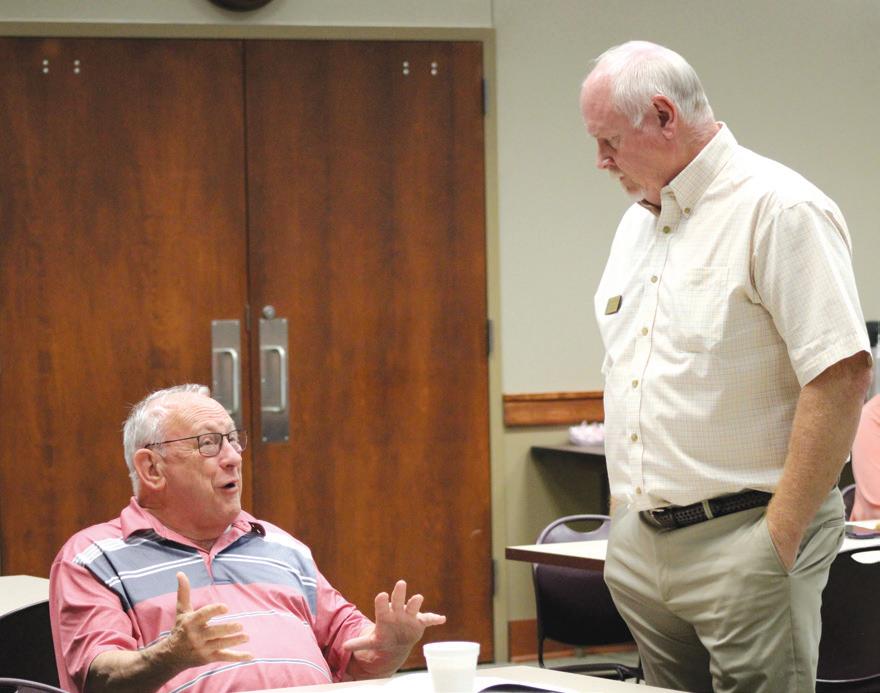

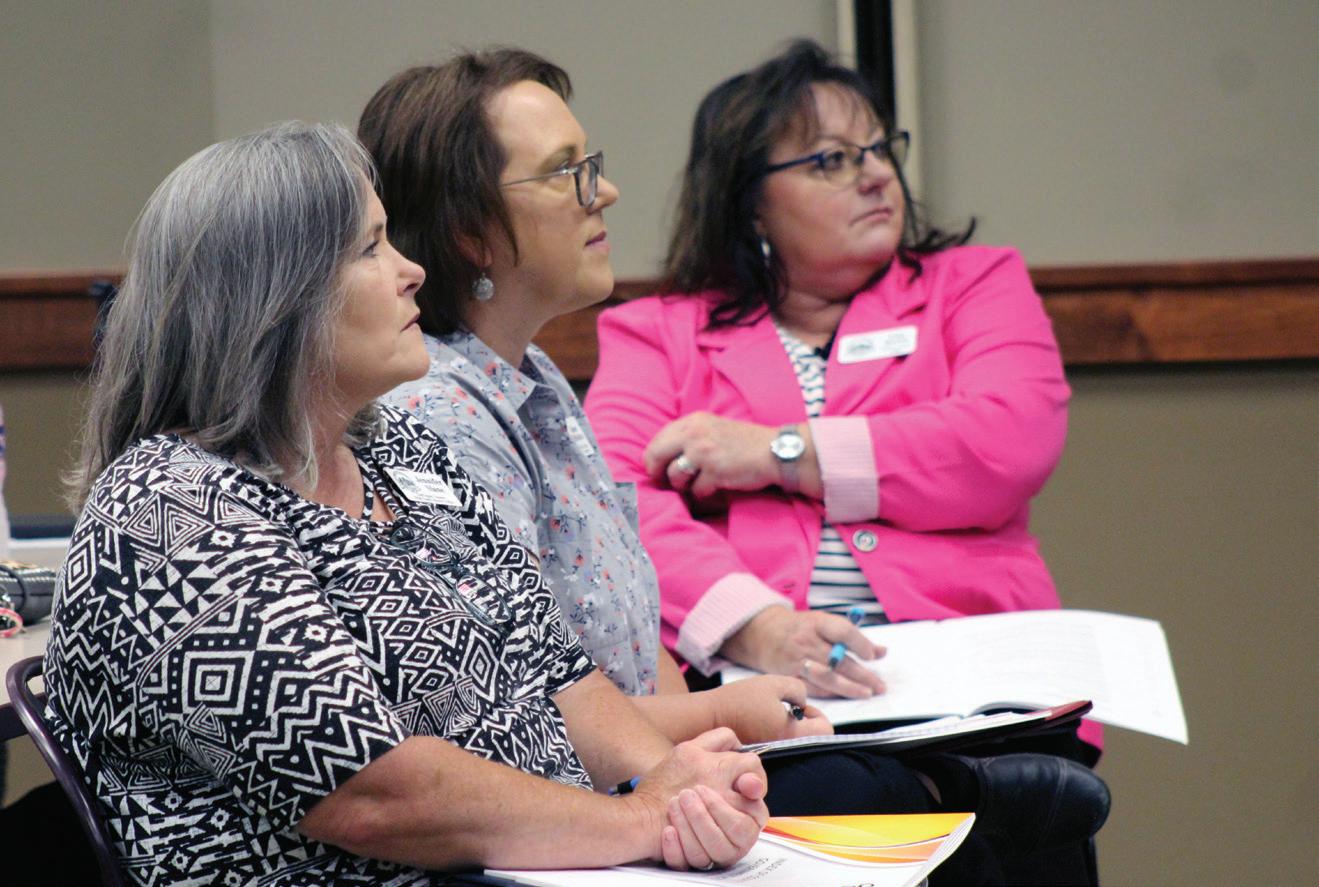
Far
Prior to the
of the
Above right: Chief Deputy Treasurer Jennifer Slane, Treasurer Janet Hibbitts and Judge Lisa Brown, all of White County, listen to a presenter explain how recent legislation will affect county officials across the state.
Above left: Craighead County Treasurer Terry McNatt, who served as the AAC legislative chair, welcomes attendees.
Right: Assessors Russell Hill of Washington County, Diane Tucker of Independence County, and Gail Snyder of White County have a discussion during the lunch break.
Right: Garland County Attorney John Howard talks with Garland County Collector Rebecca Talbert.
36 COUNTY LINES, SPRING 2023
right:
start
meeting, Johnson County Judge Herman Houston visits with Johnson County Assessor Rusty Hargrave.
AAC SAFETY MEETING






AAC PHOTO RECAP
AAC Risk Management Services hosted its annual Safety Conference on May 16, at the AAC office in Pulaski County.
Above Left: AAC Loss Control Consultant Matt Bradshaw, with Cadence Insurance, delivers an overview of the AAC Safety Program.
Above Middle: AAC Loss Control Consultant Lloyd Munn, with Cadence Insurance, speaks about the importance of following OSHA safety protocols. Above Right: Logan County Office of Emergency Management Director Tobi Miller talks with another attendee.
Above: Pike County Judge Eddie Howard and his OEM director, Lee Vincent, prepare for the start of the conference.
Top Left: White County Judge Lisa Brown and her Emergency Management director, Tyler Mize, attend the conference.
COUNTY LINES, SPRING 2023 37
Left: Johnson County had good representation from Deputy Director of Emergency Management Klay Rowbotham, Chief Deputy to the County Judge Erin Rowbotham, and Director of Emergency Management Rickey Casey.
Right: Attorney General Tim Griffin was a special guest speaker at the meeting. He discussed the state’s crime problem, including the issue of repeat offenders and inmates being released early due to lack of prison beds. He addressed the provisions of the Protect Arkansas Act passed by the state legislature and signed into law by Gov. Sarah Sanders. The most significant changes would be to Arkansas’ parole system. For a selection of the state’s most serious felonies, offenders would not be eligible for release until they have served at least 85 percent of their sentences. In the most serious cases, the bill removes parole eligibility entirely.

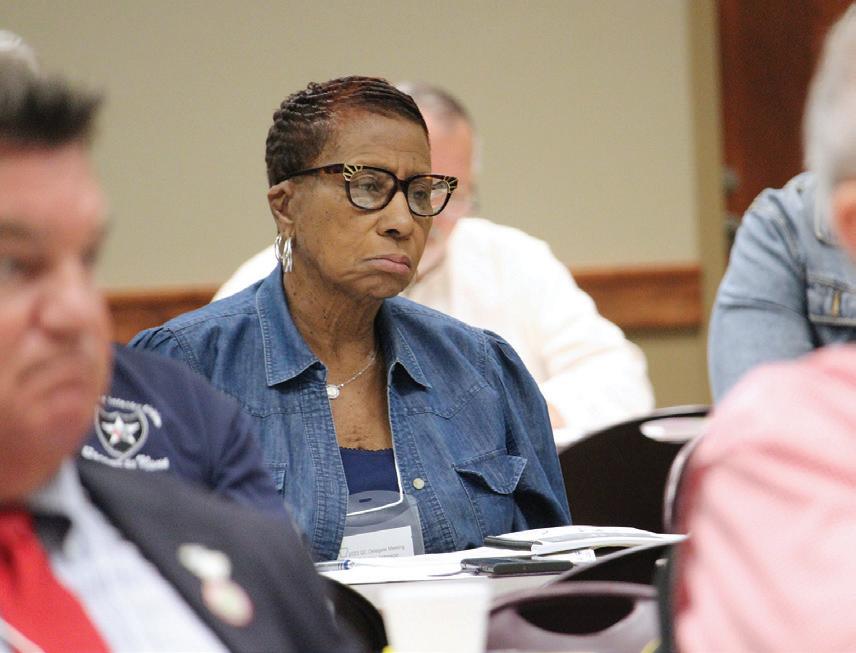



AAC PHOTO RECAP AAQC
The Arkansas Association of Quorum Court’s 75-member governing body met April 22 at the AAC.
Above: Lafayette County Justice of the Peace LeNora Jackson and Hot Spring County Justice of the Peace Don Hilyard pose for a photo during a break in the meeting.
Above: The 75-member governing body of the AAQC elected 12 justices of the peace to serve on the executive board. Front row: Dollie Wilson (Desha County), Mary Philips (Van Buren County), Lisa Ecke (Washington County), Henry Lang (Lonoke County, and Tawana Gilbert (Polk County). Back row: John Plyler (Pike County), Bobby Burns (White County), Tommy Young (Jackson County), Paul Elliott (Pulaski County), and Lloyd Clark, Jr. (Lincoln County). Not pictured are Danny Aldridge (Sebastian County) and Jenna Scott (Clark County).
Right: Poinsett County Justice of the Peace Ron Martin listens to a presentation.
38 COUNTY LINES, SPRING 2023
Far right: Jefferson County Justice of the Peace Patricia Johnson focuses on the speakers.
COUNTY COLLECTORS
The Arkansas Association of County Collectors continuing education meeting was held April 12-14 at the Winthrop Rockefeller Institute in Morrilton/Conway County.

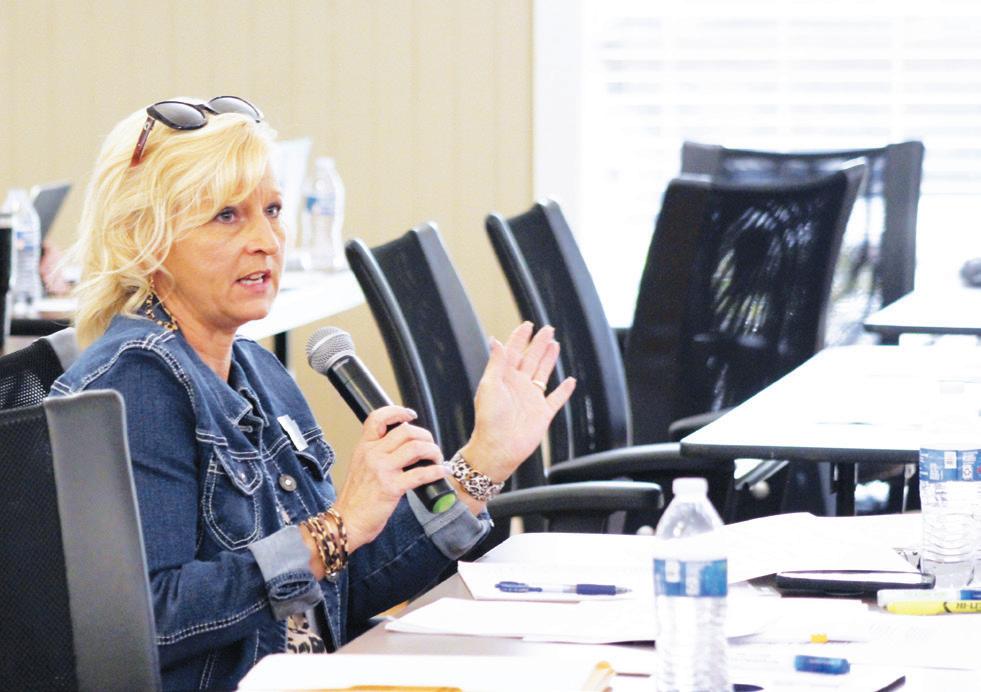


Right: Jerri Lynn Wagner and Margaret Hamilton,of Franklin County, enjoy time together at the end of the first meeting day. Far right: Chicot County Collector Jolecia Manning, left, presents Boone County Collector Amy Jenkins with a customized cup.


AAC PHOTO RECAP
Above left: Sharp County Collector Michelle Daggett, left, is all smiles while sitting at the fire pit with Deputy Collector Paige Floriani and Collector Sheri Ogden, both from Hot Spring County. Above right: The association’s Board of Directors pose for a picture together. From left are Lori Pennington, Ashley County; Beth Dorton, White County; Teresa Smith, Baxter County; Rebecca Talbert, Garland County; and Amy Jenkins, Boone County.
Above left: Greene County Collector Cindy Tracer asks a question during a discussion about DAV exemptions. Above right: Miller County Collector Laura Bates, left, and Miller County Deputy Collectors Sheila Sinyard and Miranda Cannady talk with one of the vendors at the meeting.
COUNTY LINES, SPRING 2023 39
COUNTY CLERKS





AAC PHOTO RECAP
The Arkansas County Clerks Association gathered April 5-7 in Pulaski County for a rescheduled winter meeting.
Above: From left, Pam Webb, Lee County; Renea Bailey, Sevier County; Alexandria Manning, Chicot County; and Shakira Winfield, Phillips County enjoy time together at the end of the meeting day.
Above: Clerks and meeting vendors pose for a picture while touring the Arkansas State Capitol with staff from Secretary of State John Thurston’s office.
Below: Randolph County Chief Deputy Clerk April Duff makes a presentation about how she handles small estate filings.
Right: Scott County Clerk Tracy McPherson asks a question during a roundtable portion of the meeting. Looking on is Pope County Clerk Pam Ennis
40 COUNTY LINES, SPRING 2023
Above: Greene County Clerk Phyllis Rhynes takes a shot at a basket while visiting Secretary of State John Thurston’s office.
When you participate in the AAC Workers’ Compensation Trust, you can relax in the hands of professional staff members who are going to take care of your needs. The AAC team has decades of experience in handling county government claims – they’re simply the best at what they do! Did we mention that participants in our plan are accustomed to getting money back? Since we started paying dividends in 1997, the AAC Workers’ Compensation Trust has declared almost $31.35 MILLION dollars in dividends, payable to members of the fund. In fact, we mailed $750,000 in savings back to member counties in July 2022. The service is available for any size county government and other county government-related entities. We’ve got you covered!


1415 West Third Street • Little Rock, Arkansas 72201
enjoy dividends! $31 Million paid since 1997 Experienced & licensed examiners covered We’ve got you Debbie Norman Risk Management & Insurance Director 501.375.8247 Misty Petrus Claims Manager 501.375.8698 Kim Nash Claims Adjuster 501.375.8805, ext. 546 Renee Turner Claims Adjuster 501.375.8805, ext. 545 Kim Mitchell Premium Analyst 501.375.8805, ext. 541 Ellen Wood Admin. Assistant 501.375.8805, ext. 540 Brandy McAllister RMF General Counsel 501.375.8694
Association of Arkansas Counties Workers’ Compensation Trust Members
• Youth behavioral health needs are at the forefront of the crisis. Two-thirds (67 percent) of counties reported that youth behavioral health conditions are “definitely a problem” or “very prevalent and/or severe.”
• Limited access to services inhibits county residents from receiving the help they need. Seventy-four percent of counties cited financial costs as a barrier to expanding access to behavioral health services, and 71 percent cited lack of direct service providers.
• The crisis is exacerbated by a lack of behavioral health workers. Nearly three-quarters (72 percent) of counties consider the shortage of behavioral health workers in their county to be “definitely a problem” or “a severe problem.”
• The financial and human costs of behavioral health are compounding across all county systems. Eighty percent of counties indicated that they incurred associated costs in the legal system (courts and jails), 77 percent indicated associated costs in law enforcement, and 54 percent indicated associated costs in the health system and hospitals.
The report pairs key findings with associated policy objectives (https://bit.ly/430d7Fn), including:
• Amending detrimental policies under Medicaid, like the Medicaid Inmate Exclusion Policy (MIEP) and the Institutions for Mental Diseases (IMD) exclusion
• Obtaining direct and flexible resources to support the recruitment, training and retention of a sufficient behavioral health workforce
• Enhancing the intergovernmental partnership for the development and modernization of local crisis response systems and infrastructure, and
• Enforcing policies that ensure equitable coverage for treatment of mental illness and addiction.
“We are committed to advocating for solutions that alleviate suffering, address workforce shortages, remedy systemic failures, and produce better results for all,” said Winfrey.
To access the full report, “Behavioral Health Conditions Reach Crisis Levels: Counties Urge Stronger Intergovernmental Partnerships and Outcomes,” navigate to this link: https://bit.ly/3Mx8GfV.
For more information about NACo’s Commission on Mental Health and Wellbeing, navigate to this link: https:// bit.ly/3WawTvt.
— Nicole Weissman
This publication was made possible with the support of these advertising partners who have helped to underwrite the cost of County Lines. They deserve your consideration and patronage when making your purchasing decisions. For more information on how to partner with County Lines, please call Christy L. Smith at (501) 372-7550.
Advertiser Resource Index AAC Workers’ Compensation 41 Apprentice Information Systems 43 ARBuy 11 Crews and Associates . . . . . . . . . . . . . . . . . . . . . . . . . . . . . . . . . . . . . 3 DataScout Inside Front Cover Ergon Asphalt & Paving . . . . . . . . . . . . . . . . . . . . . . . . . . . . . . . . . . . 4 Financial Intelligence 16 Guardian RFID 35 Nationwide Insurance . . . . . . . . . . . . . . . . . . . . . . . . . . . . . . . . . . . . 27 Rainwater Holt & Sexton, PA Back Cover Southern Tire Mart . . . . . . . . . . . . . . . . . . . . . . . . . . . . . . . . . . . . 8 Tax Pro 10 Young’s Irrigation & Equipment, LLC 19
NEWS FROM NACO NACo Continued From Page 35 <<<
AAC
42 COUNTY LINES, SPRING 2023








DIAL 8 888-8888 Little Rock Conway Jacksonville Hot Springs Springdale Bryant Memphis Responsible Attorneys: Mike Rainwater & Bob Sexton EXPERIENCE. COMPASSION. RESULTS. Association of Arkansas Counties 1415 West 3rd St. Little Rock, AR 72201 PRSRT STD U.S. POSTAGE PAID LITTLE ROCK, AR PERMIT No. 2797














































 Story by Sarah Perry Communications Coordinator
Story by Sarah Perry Communications Coordinator









































